- Lawrence of Arabia (1962)
- 2001: A Space Odyssey (1968)
- Chariots of Fire (1981)
- A Room with a View (1985)
- The Bridge on the River Kwai (1957)
- Cromwell (1970)
- Barry Lyndon (1975)
- The 39 Steps (1935)
- Braveheart (1995)
- That Hamilton Woman (1941)
- Saturday Night and Sunday Morning (1960)
- Get Carter (1971)
- Equus (1977)
- This Sporting Life (1963)
- Rob Roy (1995)
- The Wicker Man (1973)
- My Left Foot (1989)
- The Spy Who Came in from the Cold (1965)
- Witness for the Prosecution (1957)
- The Field (1990)
- Quadrophenia (1979)
- The Boxer (1997)
- Alfie (1966)
- This Is Spinal Tap (1984)
- The Man Who Would Be King (1975)
- Anne of the Thousand Days (1969)
- Snatch (2000)
- The General (1998)
- Billy Budd (1962)
- The Elephant Man (1980)
- Mutiny on the Bounty (1935)
- Angels & Insects (1995)
- Sunday Bloody Sunday (1971)
- Murder on the Orient Express (1974)
- A Fish Called Wanda (1988)
- Tunes of Glory (1960)
- The Madness of King George (1994)
- Sleuth (1972)
- Mona Lisa (1986)
- Becket (1964)
- Straw Dogs (1971)
- My Cousin Rachel (1952)
- Patriot Games (1992)
- And Then There Were None (1945)
- Paranoiac (1963)
- Death on the Nile (1978)
- The Lady Vanishes (1938)
- Rebecca (1940)
- The Race for the Double Helix (1987)
- Lord Jim (1965)
- The Princess Bride (1987)
- Peeping Tom (1960)
- Four Weddings and a Funeral (1994)
- A Night to Remember (1958)
- Evil Under the Sun (1982)
- Frenzy (1972)
- Moll Flanders (1996)
- The Curse of Frankenstein (1957)
- A Taste of Honey (1961)
- Juggernaut (1974)
- Maurice (1987)
- Room at the Top (1958)
- The Ipcress File (1965)
- The Killing of Sister George (1968)
- Children of the Damned (1964)
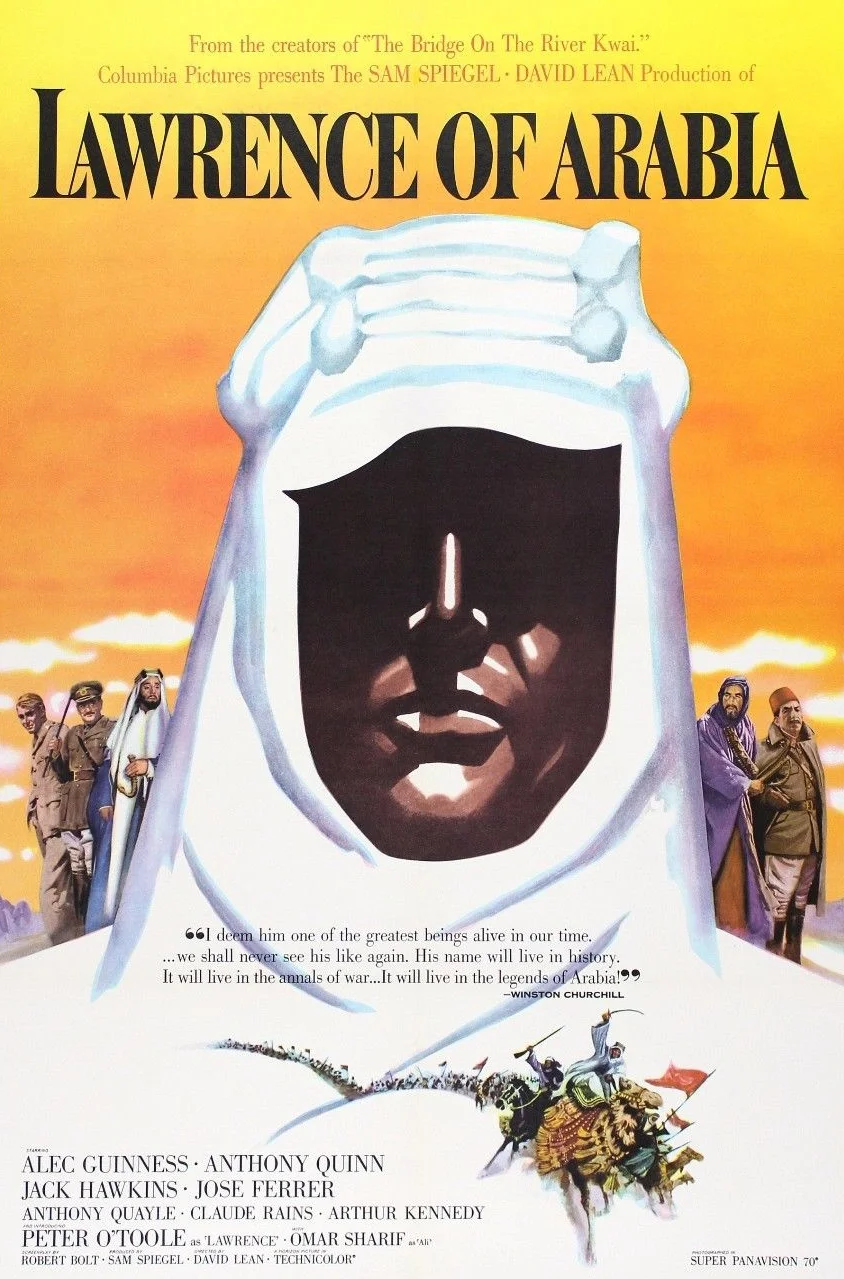 A magnificently made masterpiece, it's David Lean's magnum opus. One of the most remarkable jobs he did with his
characters is not only to make them larger than life but also mysterious in terms of their ambitions and desires.
Thanks to Freddie Young's spellbinding cinematography, it's impossible to deny the power of the desert that
Lawrence of Arabia brings to the screen.
A magnificently made masterpiece, it's David Lean's magnum opus. One of the most remarkable jobs he did with his
characters is not only to make them larger than life but also mysterious in terms of their ambitions and desires.
Thanks to Freddie Young's spellbinding cinematography, it's impossible to deny the power of the desert that
Lawrence of Arabia brings to the screen.
 Birth. Evolution. Mankind. Age. Exploration. Universe. Death. 2001: A Space Odyssey...you'll never see
anything like it, a brilliant visionary picture that's abstract, beautiful, complicated, and simple all at once.
Considering the year the movie was made in—and that's not 1968—but 1963 which is five years of work
to make the vision possible.
Birth. Evolution. Mankind. Age. Exploration. Universe. Death. 2001: A Space Odyssey...you'll never see
anything like it, a brilliant visionary picture that's abstract, beautiful, complicated, and simple all at once.
Considering the year the movie was made in—and that's not 1968—but 1963 which is five years of work
to make the vision possible.
 Very few films have the distinction of being described as one of the most beautiful made, and
Chariots of Fire, without doubt, is such that. The opening scene of runners on the beach is absolutely
powerful and represents what the movie is all about: the celebration of human spirit. Honor and virtue are
routinely stressed and backed by actions.
Very few films have the distinction of being described as one of the most beautiful made, and
Chariots of Fire, without doubt, is such that. The opening scene of runners on the beach is absolutely
powerful and represents what the movie is all about: the celebration of human spirit. Honor and virtue are
routinely stressed and backed by actions.
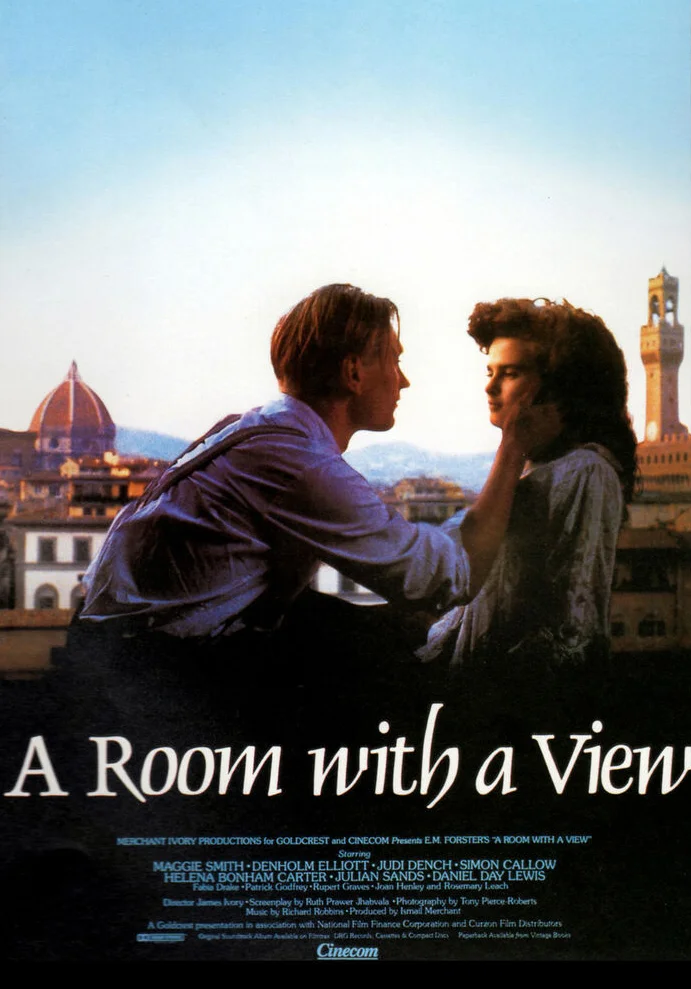 If you have to pick one Merchant Ivory picture to watch, make it A Room with a View. It's a rare
achievement in filmmaking which is transforming the screenplay into a motion picture with the feel of a 19th
century novel with brilliant performances. The direction is adroitly done, and the cinematography is magnificent.
If you have to pick one Merchant Ivory picture to watch, make it A Room with a View. It's a rare
achievement in filmmaking which is transforming the screenplay into a motion picture with the feel of a 19th
century novel with brilliant performances. The direction is adroitly done, and the cinematography is magnificent.
 "Madness. Madness!" The exclamation at the end says it all about The Bridge on the River Kwai, a thrilling
WWII picture with William Holden and Alec Guinness at their finest. Against them is the massive bridge that
overshadows everything and therefore must be brought down.
"Madness. Madness!" The exclamation at the end says it all about The Bridge on the River Kwai, a thrilling
WWII picture with William Holden and Alec Guinness at their finest. Against them is the massive bridge that
overshadows everything and therefore must be brought down.
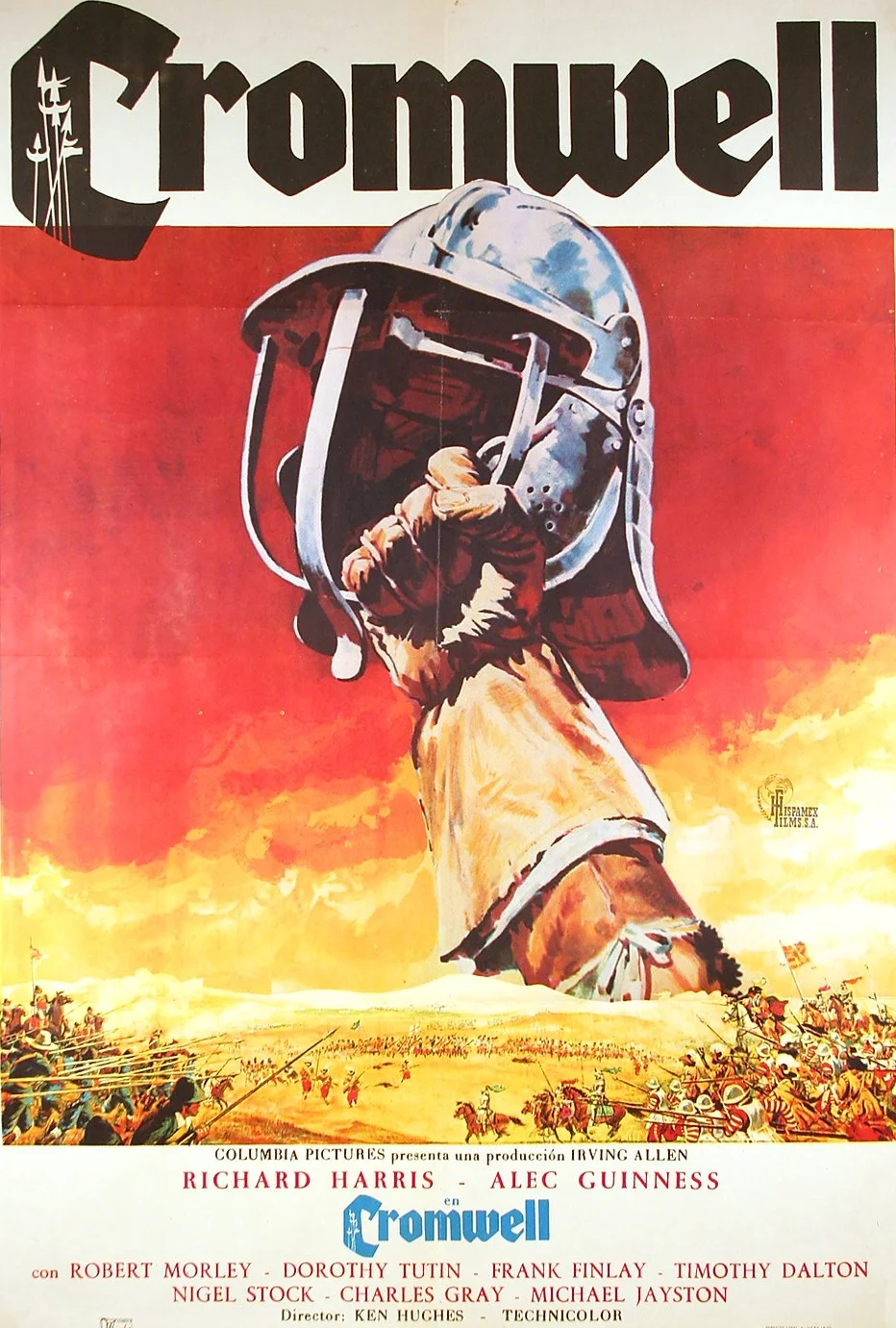 This is British history at its finest with some of the best acting and most terrific battle scenes ever.
Because of the thousands of extras and warlike atmosphere, it's reminiscent of Braveheart minus a love
story. The British production deservingly won an Oscar for Best Costume Design with approximately 4,000 costumes,
16,000 historical props, and thousands of wigs which were ordered from all over Europe.
This is British history at its finest with some of the best acting and most terrific battle scenes ever.
Because of the thousands of extras and warlike atmosphere, it's reminiscent of Braveheart minus a love
story. The British production deservingly won an Oscar for Best Costume Design with approximately 4,000 costumes,
16,000 historical props, and thousands of wigs which were ordered from all over Europe.
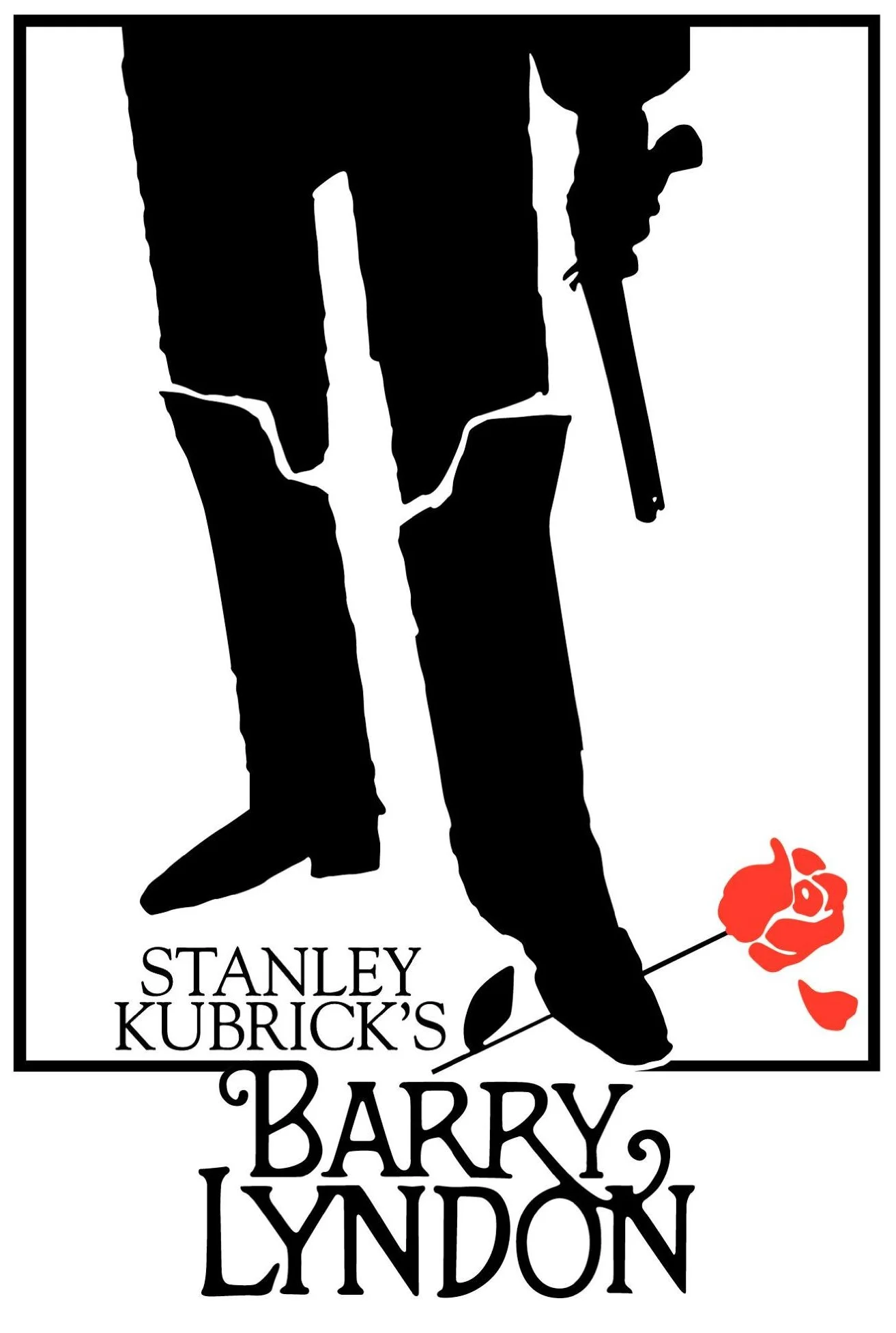 Ryan O'Neal's finest hour in acting is showcased in Barry Lyndon, a superbly photographed flick that
defines filmmaking in every bit of the word. It's thorough masterpiece for an 18th century British period picture,
and there are many things to like: the story, the acting, the costumes, the in/exterior sets (the latter was
shot on location in Ireland, England, and West Germany and the former in London), the deliberate pace, the
coldness, and, most of all, the cinematography.
Ryan O'Neal's finest hour in acting is showcased in Barry Lyndon, a superbly photographed flick that
defines filmmaking in every bit of the word. It's thorough masterpiece for an 18th century British period picture,
and there are many things to like: the story, the acting, the costumes, the in/exterior sets (the latter was
shot on location in Ireland, England, and West Germany and the former in London), the deliberate pace, the
coldness, and, most of all, the cinematography.
 The most definitive Hitchcock picture made, The 39 Steps is the gold standard that many espionage
pictures have failed to match. Robert Donat has never been better, and Lucie Mannheim deserves credit for
setting the tone. The formula of Alfred Hitchcock's many films can be readily found here.
The most definitive Hitchcock picture made, The 39 Steps is the gold standard that many espionage
pictures have failed to match. Robert Donat has never been better, and Lucie Mannheim deserves credit for
setting the tone. The formula of Alfred Hitchcock's many films can be readily found here.
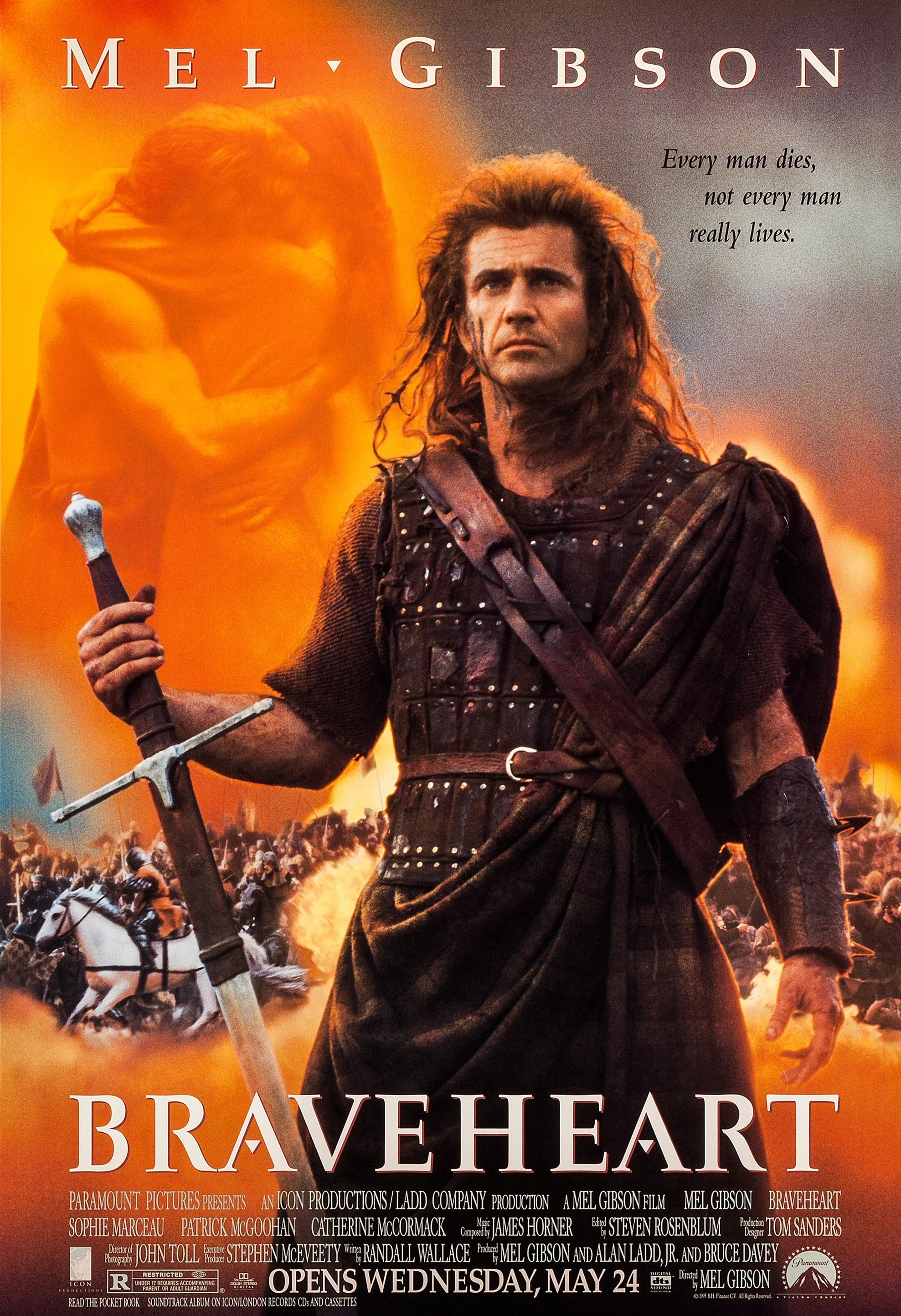 A surprise Oscar winner for Best Picture of 1995, Braveheart is the last great epic war motion picture.
Characters, big, small, clean, dirty, and nameless, all play a large role in scene after scene with so many of
them memorable. Passion is easily felt throughout the wonderful storytelling with a strong script and some of
the most brutal medieval battle scenes ever filmed.
A surprise Oscar winner for Best Picture of 1995, Braveheart is the last great epic war motion picture.
Characters, big, small, clean, dirty, and nameless, all play a large role in scene after scene with so many of
them memorable. Passion is easily felt throughout the wonderful storytelling with a strong script and some of
the most brutal medieval battle scenes ever filmed.
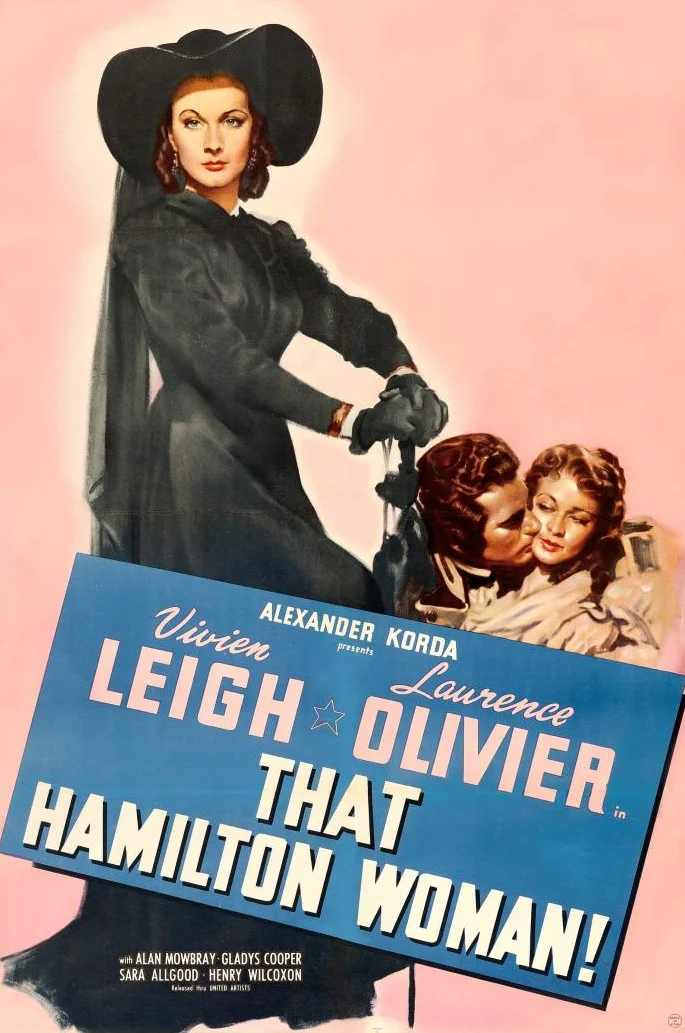 Reportedly, That Hamilton Woman is Winston Churchill's favorite film, having seen it over eighty times.
It's not hard to see why. This is an excellent film that's about overcoming adversity to rouse British (and
possibly American) support to enter WWII and showcases the very best of Laurence Olivier's and Vivien Leigh's
talents in their third and final collaboration.
Reportedly, That Hamilton Woman is Winston Churchill's favorite film, having seen it over eighty times.
It's not hard to see why. This is an excellent film that's about overcoming adversity to rouse British (and
possibly American) support to enter WWII and showcases the very best of Laurence Olivier's and Vivien Leigh's
talents in their third and final collaboration.
 "All I'm out for is a good time...all the rest is propaganda." So begins the great acting career of Albert Finney
in Saturday Night and Sunday Morning, an intense British angry man film that'll see his character grow up
finally at the end after partaking of self-destruction. It's maybe the best film of the British kitchen sink
drama genre.
"All I'm out for is a good time...all the rest is propaganda." So begins the great acting career of Albert Finney
in Saturday Night and Sunday Morning, an intense British angry man film that'll see his character grow up
finally at the end after partaking of self-destruction. It's maybe the best film of the British kitchen sink
drama genre.
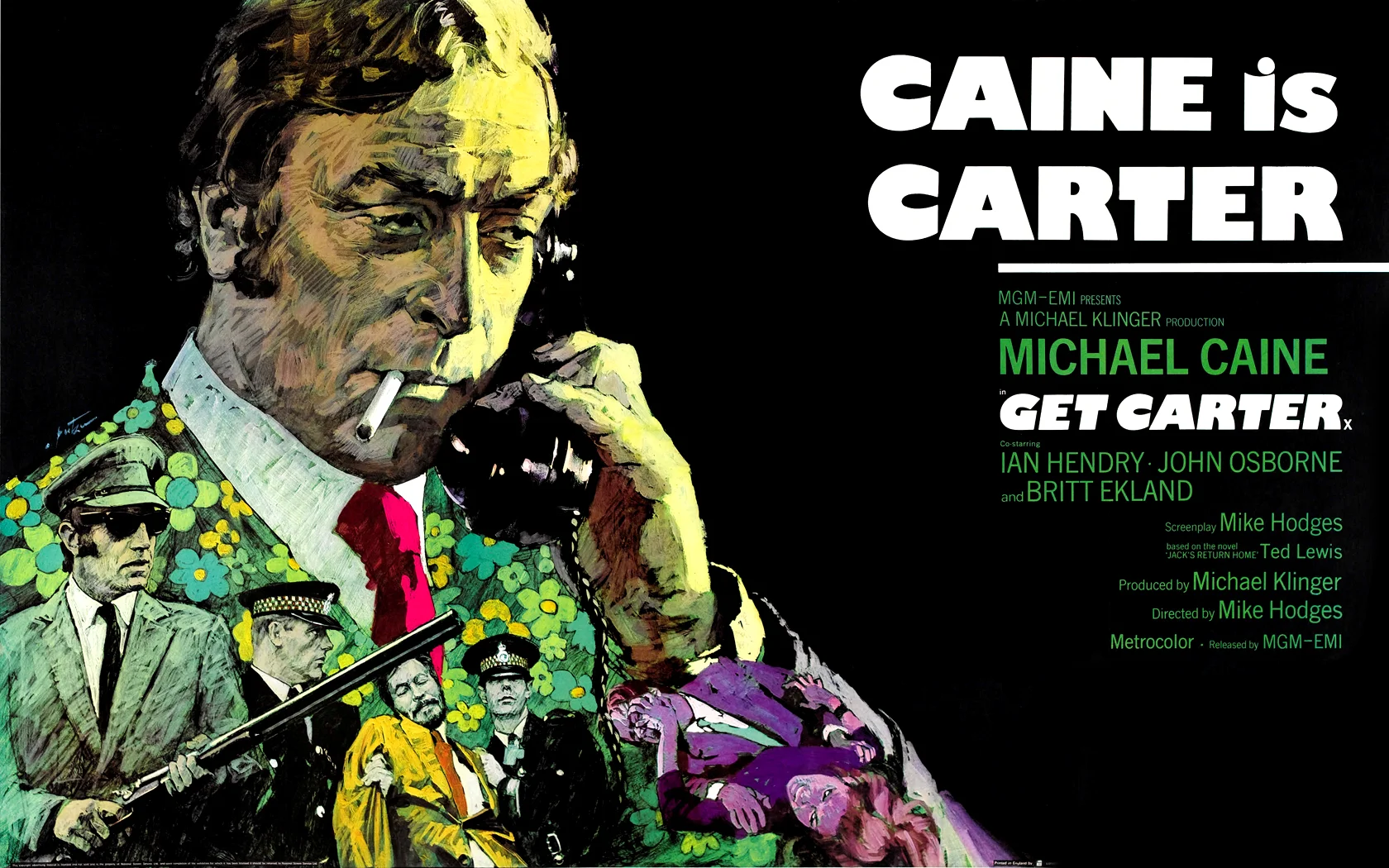 A brutal British gangster masterpiece, Get Carter is that good and clever. The reason why it's so is that
when the characters are introduced at the beginning of the film, little do I know they'll play an important role
in the murder mystery. It's just that the plot takes time to thicken and...oh, how it thickens. This is Michael
Caine at his finest.
A brutal British gangster masterpiece, Get Carter is that good and clever. The reason why it's so is that
when the characters are introduced at the beginning of the film, little do I know they'll play an important role
in the murder mystery. It's just that the plot takes time to thicken and...oh, how it thickens. This is Michael
Caine at his finest.
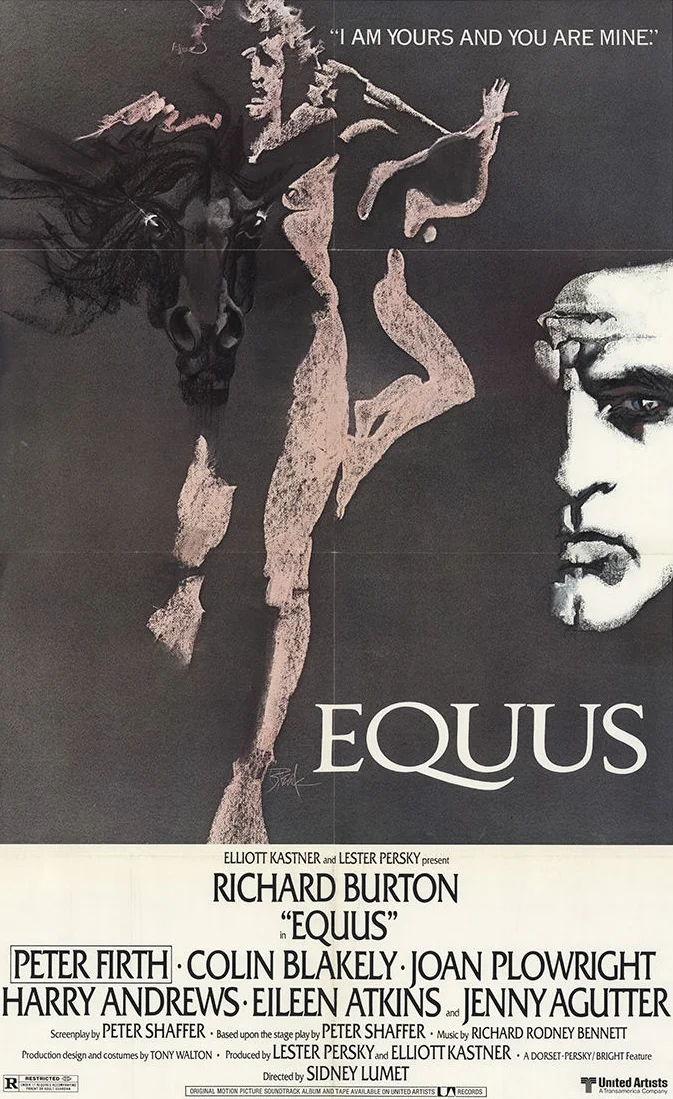 Brilliant writing, brilliant acting, and brilliant story. After sloshing around in the world of alcohol and
therefore wasting his talent for years, Richard Burton makes the greatest comeback of all time by appearing in
Equus as psychiatrist Martin Dysart by giving a fiery but focused performance. His riveting soliloquies
are the stuff of greats. On the other hand, Peter Firth is unforgettable as the tormented boy.
Brilliant writing, brilliant acting, and brilliant story. After sloshing around in the world of alcohol and
therefore wasting his talent for years, Richard Burton makes the greatest comeback of all time by appearing in
Equus as psychiatrist Martin Dysart by giving a fiery but focused performance. His riveting soliloquies
are the stuff of greats. On the other hand, Peter Firth is unforgettable as the tormented boy.
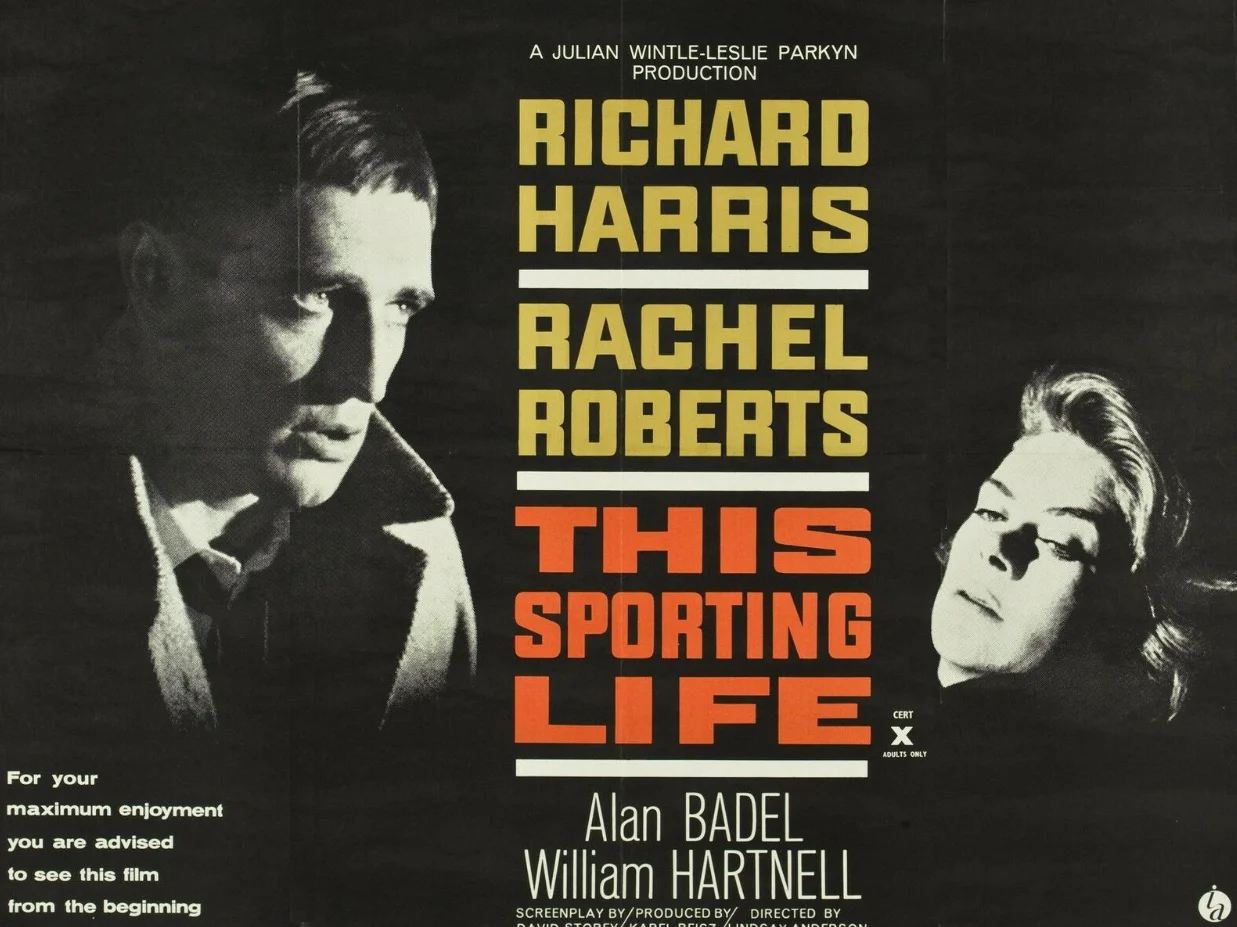 Powerful and violent, This Sporting Life is the definition of British kitchen sink realism. Richard
Harris' performance is a testament of what an enormous talent he was back then. It's hard not to be bowled over
by his tough, uncompromising acting. Rachel Roberts is special, too.
Powerful and violent, This Sporting Life is the definition of British kitchen sink realism. Richard
Harris' performance is a testament of what an enormous talent he was back then. It's hard not to be bowled over
by his tough, uncompromising acting. Rachel Roberts is special, too.
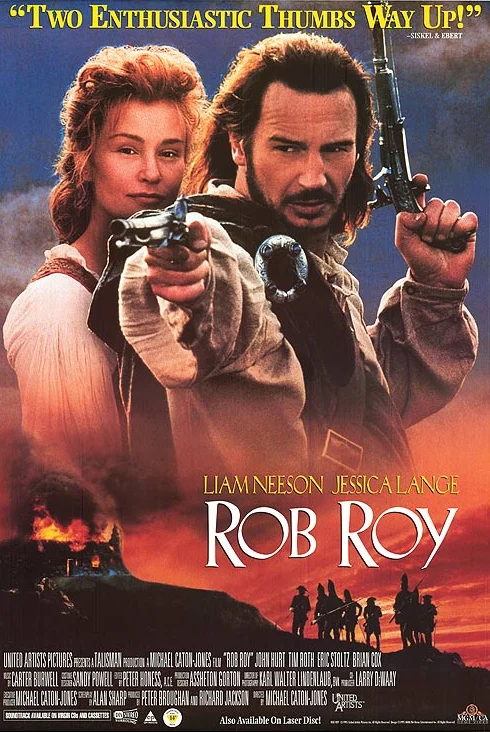 Rob Roy is one of the best swashbuckling films made. The writing, the acting, and the stabs at
primitiveness are uniformly excellent. Then, there's the larger-than-life Rob Roy against the backdrop of the
Scottish Highlands. The sword battle at the end is perfectly choreographed and is thus the best ever. Tim Roth
is unbelievable, garnering an Oscar nomination.
Rob Roy is one of the best swashbuckling films made. The writing, the acting, and the stabs at
primitiveness are uniformly excellent. Then, there's the larger-than-life Rob Roy against the backdrop of the
Scottish Highlands. The sword battle at the end is perfectly choreographed and is thus the best ever. Tim Roth
is unbelievable, garnering an Oscar nomination.
 The Citizen Kane of horror films? You got that right. The genius behind a horror film, as evidenced in
Don Siegel's Invasion of the Body Snatchers, is to make the world seemingly ordinary that's free of
monsters, blood, gore, etc. Yet there's still something fundamentally wrong with the picture. That's why
The Wicker Man succeeds, thanks to Anthony Shaffer's screenplay.
The Citizen Kane of horror films? You got that right. The genius behind a horror film, as evidenced in
Don Siegel's Invasion of the Body Snatchers, is to make the world seemingly ordinary that's free of
monsters, blood, gore, etc. Yet there's still something fundamentally wrong with the picture. That's why
The Wicker Man succeeds, thanks to Anthony Shaffer's screenplay.
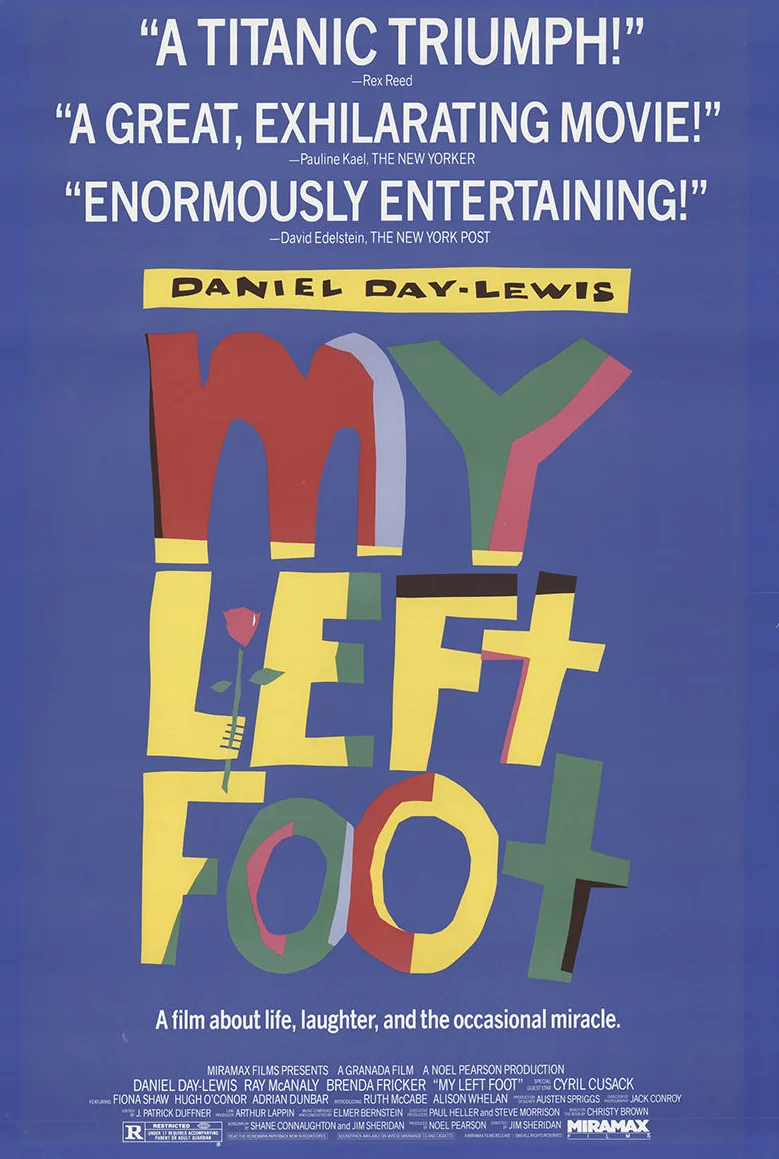 Full of powerful scenes set in Ireland, My Left Foot proves why Daniel Day-Lewis is such a gifted actor.
However, not much of credit is given to the youth named Hugh O'Conor who's his equal as Christy Brown who was
born with severe cerebral palsy that left him almost entirely paralyzed. Brenda Fricker is also special in an
Oscar-winning performance.
Full of powerful scenes set in Ireland, My Left Foot proves why Daniel Day-Lewis is such a gifted actor.
However, not much of credit is given to the youth named Hugh O'Conor who's his equal as Christy Brown who was
born with severe cerebral palsy that left him almost entirely paralyzed. Brenda Fricker is also special in an
Oscar-winning performance.
 Move over, James Bond...here comes a real spy by the name of Alec Leamas. Nominated for Best Actor Academy Award,
Richard Burton is devastatingly good as a "seedy, squalid" spy who has seen it all and is disgusted with life.
His performance is in the top two or three of his career.
Move over, James Bond...here comes a real spy by the name of Alec Leamas. Nominated for Best Actor Academy Award,
Richard Burton is devastatingly good as a "seedy, squalid" spy who has seen it all and is disgusted with life.
His performance is in the top two or three of his career.
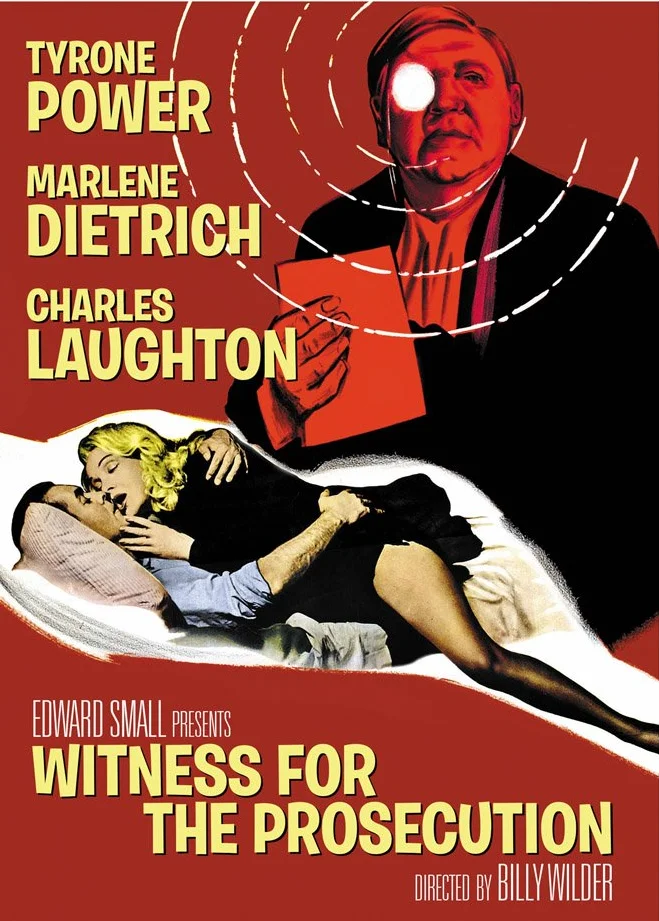 Adapted from a Agatha Christie's novel, Witness for the Prosecution is a classic Billy Wilder picture.
Charles Laughton gives the most outstanding performance while Marlene Dietrich is fantastic. The ending is the
cherry on top of the cake.
Adapted from a Agatha Christie's novel, Witness for the Prosecution is a classic Billy Wilder picture.
Charles Laughton gives the most outstanding performance while Marlene Dietrich is fantastic. The ending is the
cherry on top of the cake.
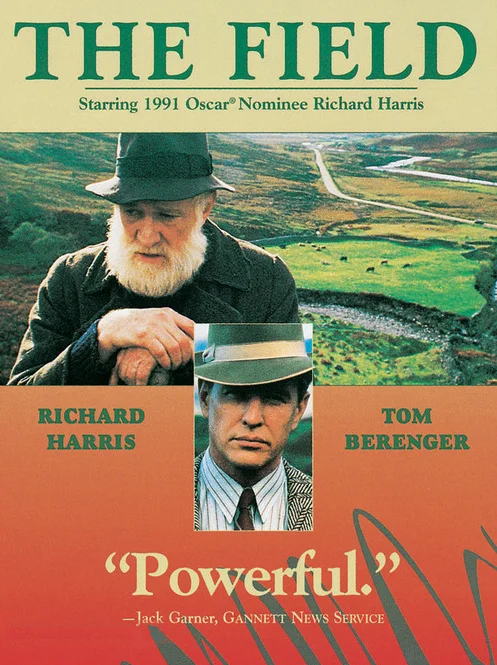 Richard Harris received his second Oscar nomination for mounting the greatest comeback of his career after more
than a decade of crap films. Unquestionably, The Field is a snapshot of Ireland through and through. It's
impossible not to be enraptured by the verdant landscape that's surrounded by rocks and crags under the cover
of melancholy clouds.
Richard Harris received his second Oscar nomination for mounting the greatest comeback of his career after more
than a decade of crap films. Unquestionably, The Field is a snapshot of Ireland through and through. It's
impossible not to be enraptured by the verdant landscape that's surrounded by rocks and crags under the cover
of melancholy clouds.
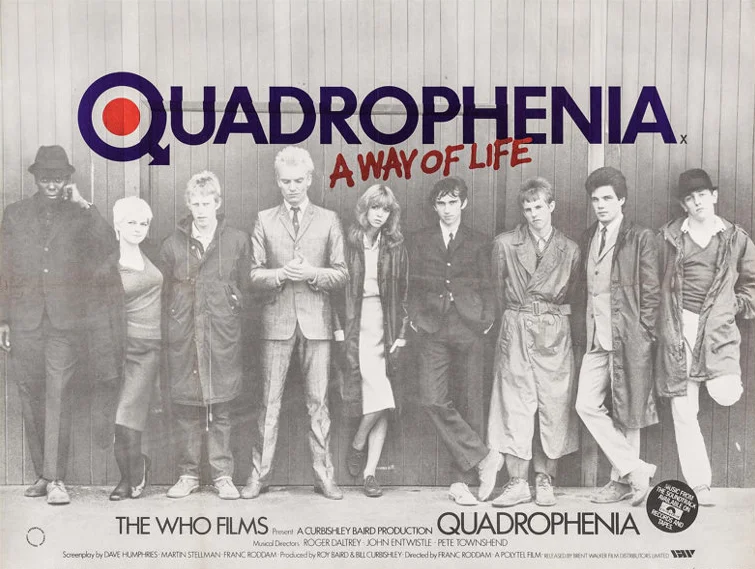 Quadrophenia is an excellent coming-of-age British picture with lots of mod subculture and music from
The Who. It's a great performance by Phil Daniels while Ray Winstone is about to break out. In the first role
of his career, Sting of The Police wasn't yet popular. The finale showing the White Cliffs of Beachy Head is
a can't-miss.
Quadrophenia is an excellent coming-of-age British picture with lots of mod subculture and music from
The Who. It's a great performance by Phil Daniels while Ray Winstone is about to break out. In the first role
of his career, Sting of The Police wasn't yet popular. The finale showing the White Cliffs of Beachy Head is
a can't-miss.
 "I'm not a killer, Maggie, but this place makes me want to kill." The Boxer is terrific for its IRA
backstory serving as the political force to keep two lovers apart yet they refuse to be. People have to dig
Daniel Day-Lewis in a serious drama role. It's his quiet intensity that's effective. Also outstanding are the
supporting roles and Chris Menges' cinematography.
"I'm not a killer, Maggie, but this place makes me want to kill." The Boxer is terrific for its IRA
backstory serving as the political force to keep two lovers apart yet they refuse to be. People have to dig
Daniel Day-Lewis in a serious drama role. It's his quiet intensity that's effective. Also outstanding are the
supporting roles and Chris Menges' cinematography.
 Alfie is the one that made Michael Caine an international star. There's no question he's brilliant.
Scoring the first Oscar nomination of his career, Michael Caine is beautiful when it comes to the delivery of
the English language. Of course, Bill Naughton's Oscar-nominated screenplay is a major part of it.
Alfie is the one that made Michael Caine an international star. There's no question he's brilliant.
Scoring the first Oscar nomination of his career, Michael Caine is beautiful when it comes to the delivery of
the English language. Of course, Bill Naughton's Oscar-nominated screenplay is a major part of it.
 "Ladies and gentlemen, direct from Hell, Spinal Tap!!" Genius is written all over this film, one of the
funniest ever. Christopher Guest, Michael McKean, and Harry Shearer are brilliant. Many viewers thought the
English band was real, and they got fooled big time. That's how convincing these actors were. To think of the
movie is to think of the timeless quotes and scenes.
"Ladies and gentlemen, direct from Hell, Spinal Tap!!" Genius is written all over this film, one of the
funniest ever. Christopher Guest, Michael McKean, and Harry Shearer are brilliant. Many viewers thought the
English band was real, and they got fooled big time. That's how convincing these actors were. To think of the
movie is to think of the timeless quotes and scenes.
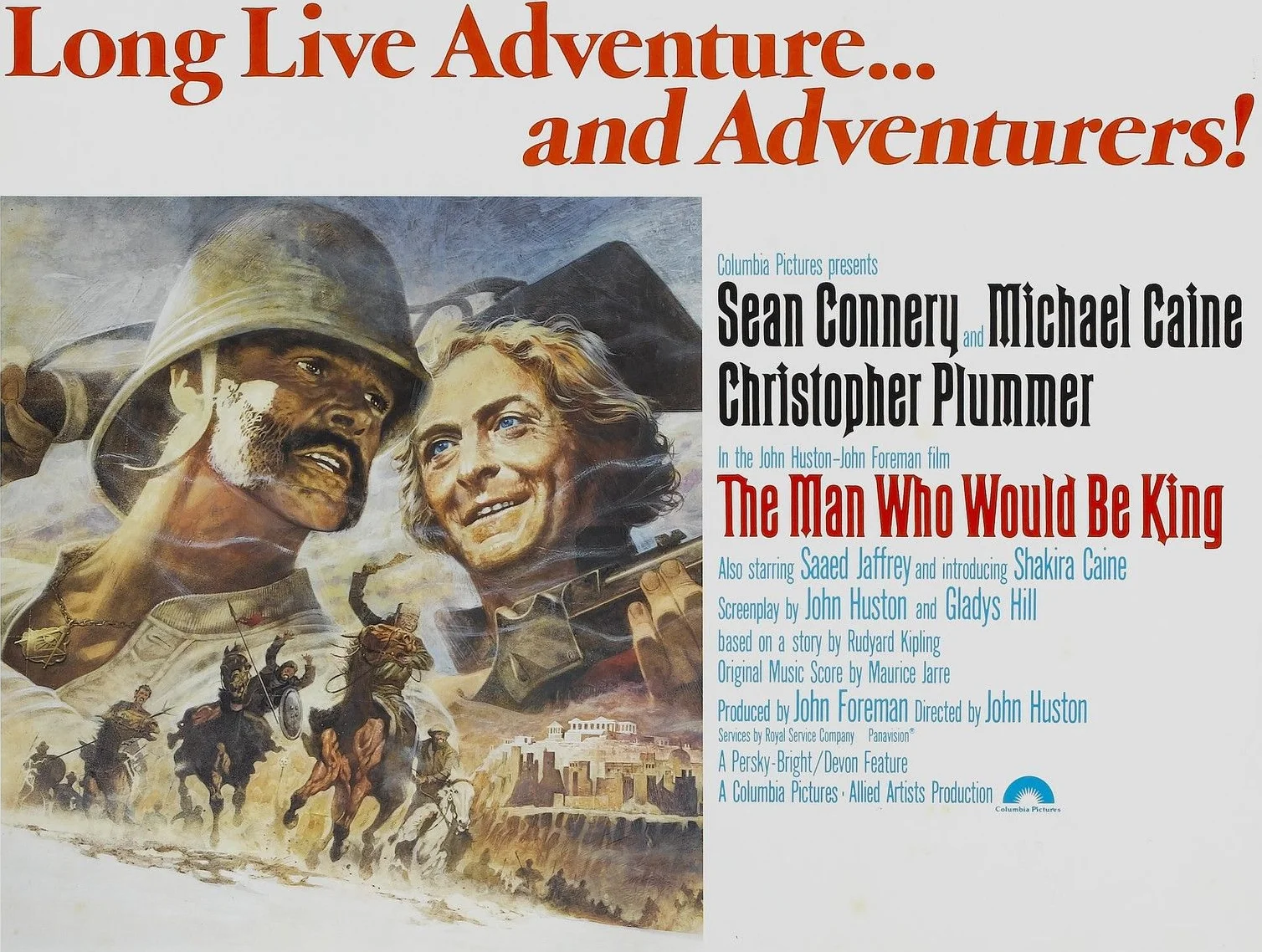 The Man Who Would Be King is first-rate entertainment at the hands of John Huston. Do not ever expect
anything less from him because he always has a great yarn to tell. Michael Caine and Sean Connery deliver
some of the best acting of their careers. The ending puts the final stamp on the film's greatness.
The Man Who Would Be King is first-rate entertainment at the hands of John Huston. Do not ever expect
anything less from him because he always has a great yarn to tell. Michael Caine and Sean Connery deliver
some of the best acting of their careers. The ending puts the final stamp on the film's greatness.
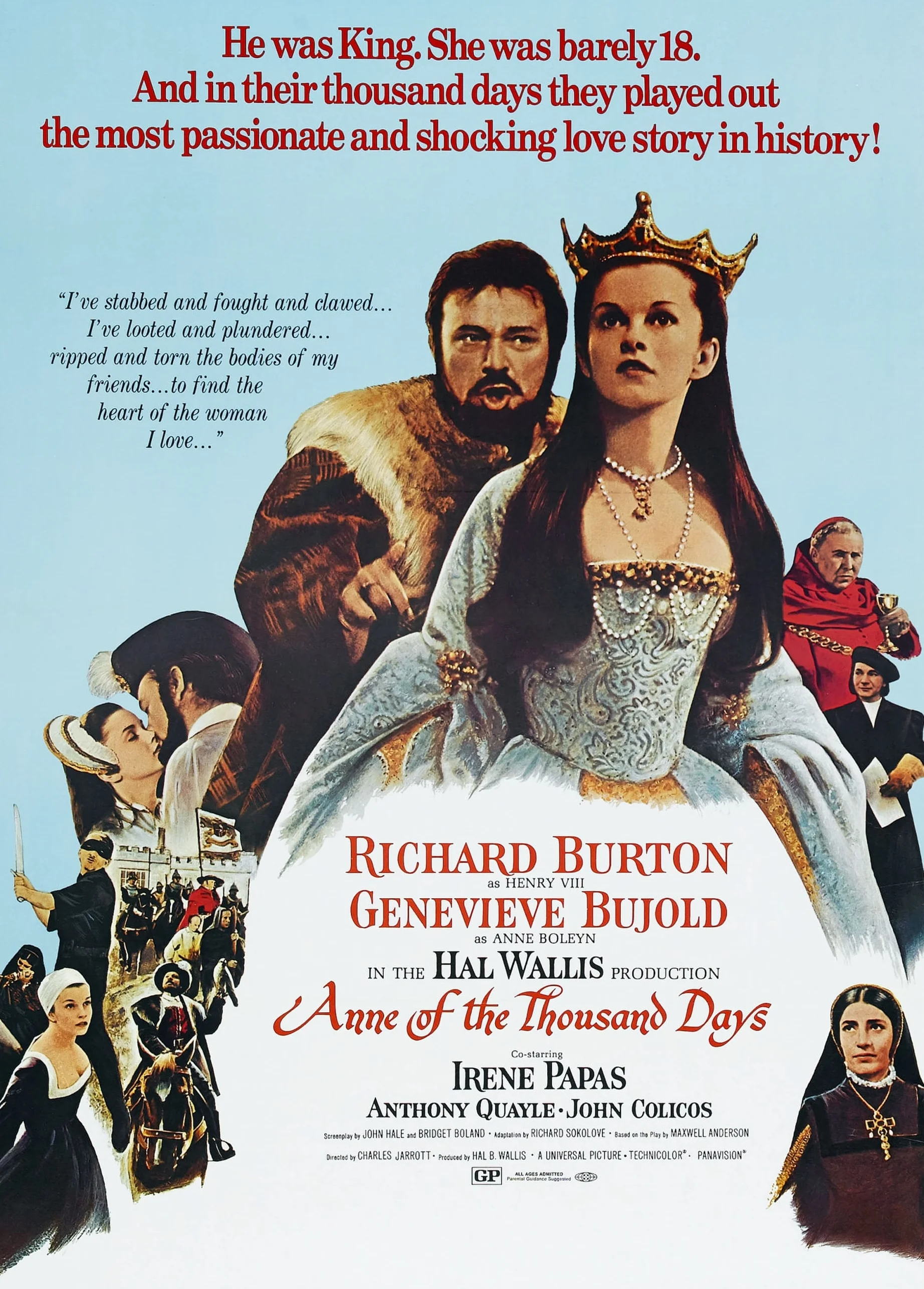 If I have to pick a film with the best-looking costumes, it's Anne of the Thousand Days. Hence, it's not
a surprise this one received the only Oscar win, out of ten nominations, for Best Costume Design which went
to Margaret Furse. The cinematography is a bonus as well. Anne of the Thousand Days is a resplendent
picture that's first-rate royalty entertainment.
If I have to pick a film with the best-looking costumes, it's Anne of the Thousand Days. Hence, it's not
a surprise this one received the only Oscar win, out of ten nominations, for Best Costume Design which went
to Margaret Furse. The cinematography is a bonus as well. Anne of the Thousand Days is a resplendent
picture that's first-rate royalty entertainment.
 The coolest movie of the decade, Snatch consists of all stars giving riveting performances. The
convoluted parallel threads, which converge to a single point, are why Snatch is a confusing film to
follow from the get-go, but watching it over and over will bring more appreciation for Guy Ritchie's unique
style of storytelling.
The coolest movie of the decade, Snatch consists of all stars giving riveting performances. The
convoluted parallel threads, which converge to a single point, are why Snatch is a confusing film to
follow from the get-go, but watching it over and over will bring more appreciation for Guy Ritchie's unique
style of storytelling.
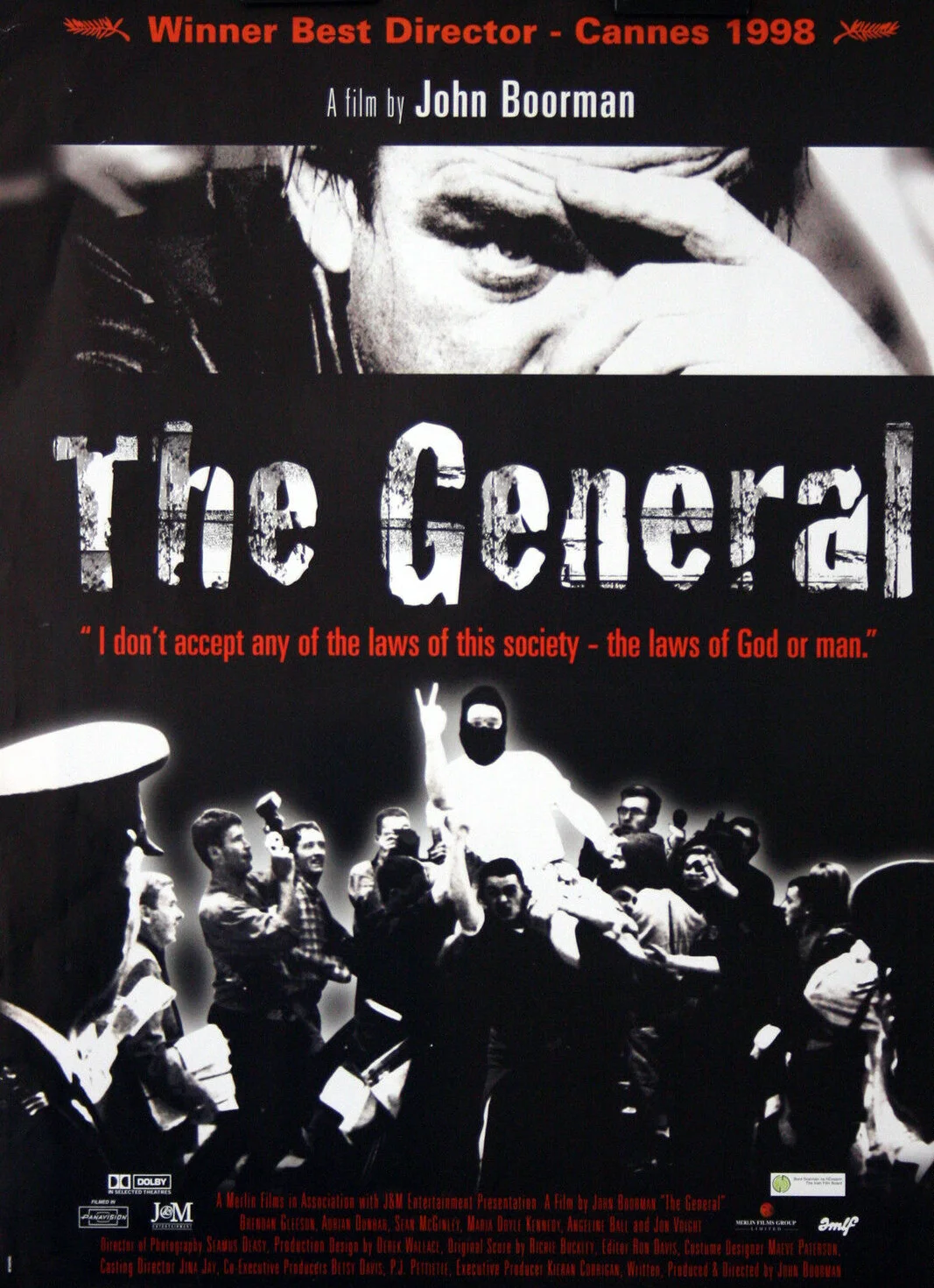 Based on Paul Williams' eponymous biography, The General tells a true story about Martin Cahill, the
leader of an Irish gang that pulled off two big-time heists with cunningness and intelligence. This is Brendan
Gleeson's show. There are also good performances from his Irish co-stars such as Adrian Dunbar, Maria Doyle
Kennedy, Angeline Ball, and Sean McGinley.
Based on Paul Williams' eponymous biography, The General tells a true story about Martin Cahill, the
leader of an Irish gang that pulled off two big-time heists with cunningness and intelligence. This is Brendan
Gleeson's show. There are also good performances from his Irish co-stars such as Adrian Dunbar, Maria Doyle
Kennedy, Angeline Ball, and Sean McGinley.
 The "welkin-eyed" Terence Stamp makes his feature film debut in Billy Budd. Hence, he was rewarded with
an Academy Award nomination, the first and only of his career which is a well-deserved achievement because
he's something else as the titular character.
The "welkin-eyed" Terence Stamp makes his feature film debut in Billy Budd. Hence, he was rewarded with
an Academy Award nomination, the first and only of his career which is a well-deserved achievement because
he's something else as the titular character.
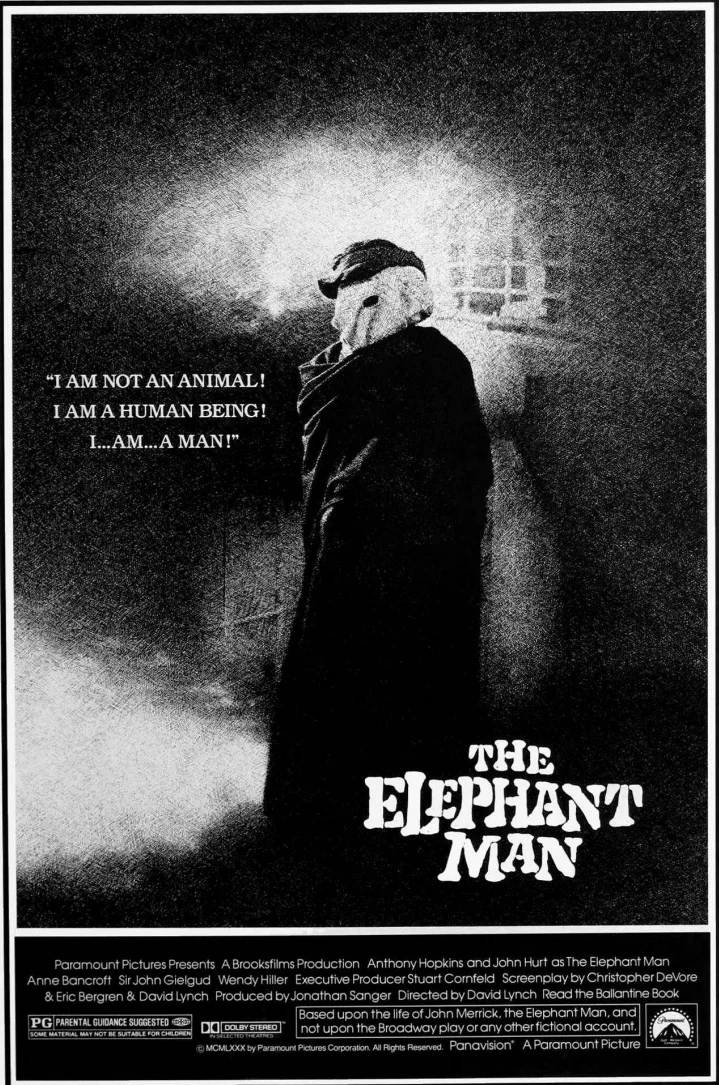 One of the most touching films made, The Elephant Man is the one that forced the Academy Awards to
start rewarding makeup artists the following year. John Hurt and Anthony Hopkins are masterful, and Freddie
Francis' black-and-white cinematography is top-notch.
One of the most touching films made, The Elephant Man is the one that forced the Academy Awards to
start rewarding makeup artists the following year. John Hurt and Anthony Hopkins are masterful, and Freddie
Francis' black-and-white cinematography is top-notch.
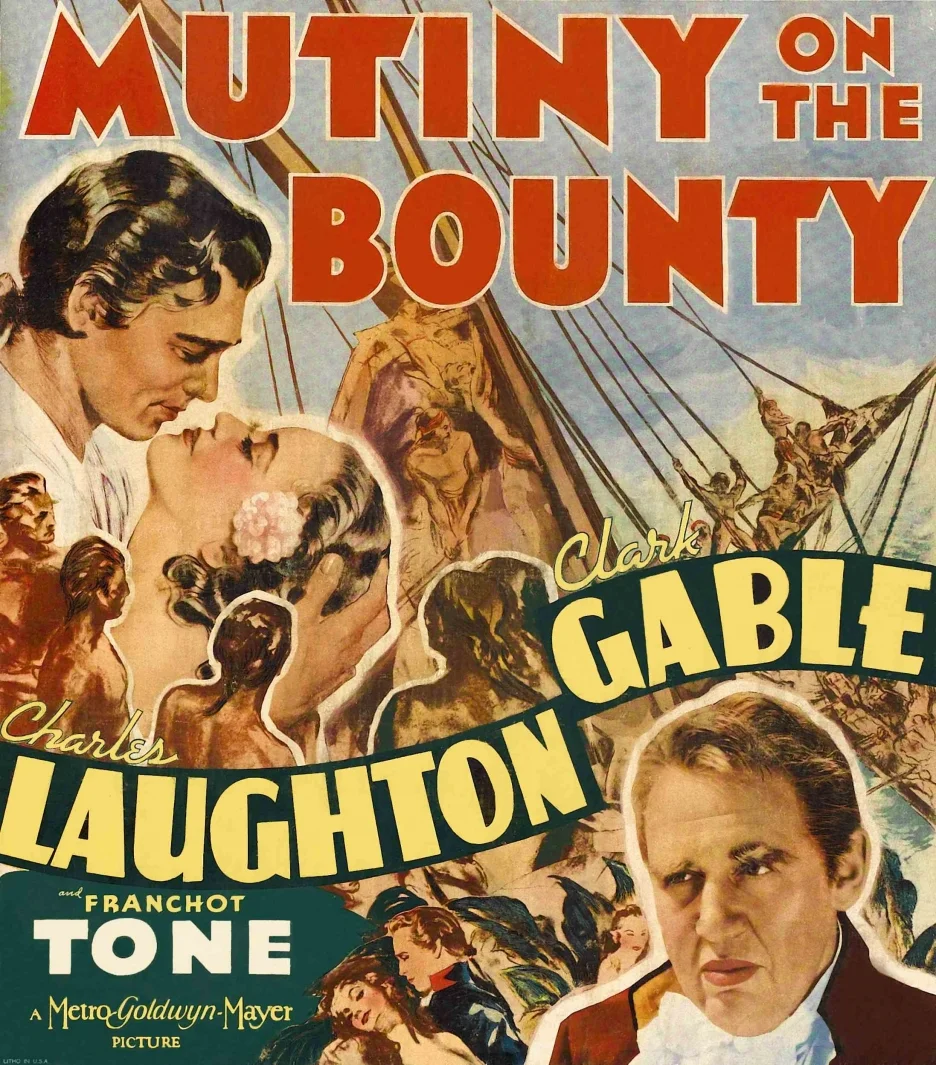 Mutiny on the Bounty is an expertly made picture given the year it was filmed in which features a
sweeping story. It's highly watchable because of Clark Gable who steals the show in every scene. And Charles
Laughton is mesmerizing as Captain Bligh.
Mutiny on the Bounty is an expertly made picture given the year it was filmed in which features a
sweeping story. It's highly watchable because of Clark Gable who steals the show in every scene. And Charles
Laughton is mesmerizing as Captain Bligh.
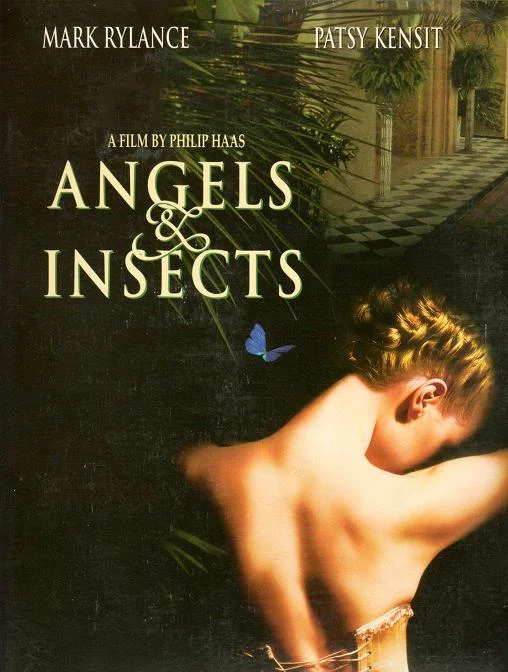 Like the costume design and in/exterior sets, the writing is very good, easily fooling me that it was adapted
from an 18th or 19th century book when the novella was actually written in 1992. Even better is the acting
with a lot of subtleties going on. Mark Rylance is perfect, Kristin Scott Thomas is stunning, and Douglas
Henshall is deliciously nasty, dropping plenty of hints here and there.
Like the costume design and in/exterior sets, the writing is very good, easily fooling me that it was adapted
from an 18th or 19th century book when the novella was actually written in 1992. Even better is the acting
with a lot of subtleties going on. Mark Rylance is perfect, Kristin Scott Thomas is stunning, and Douglas
Henshall is deliciously nasty, dropping plenty of hints here and there.
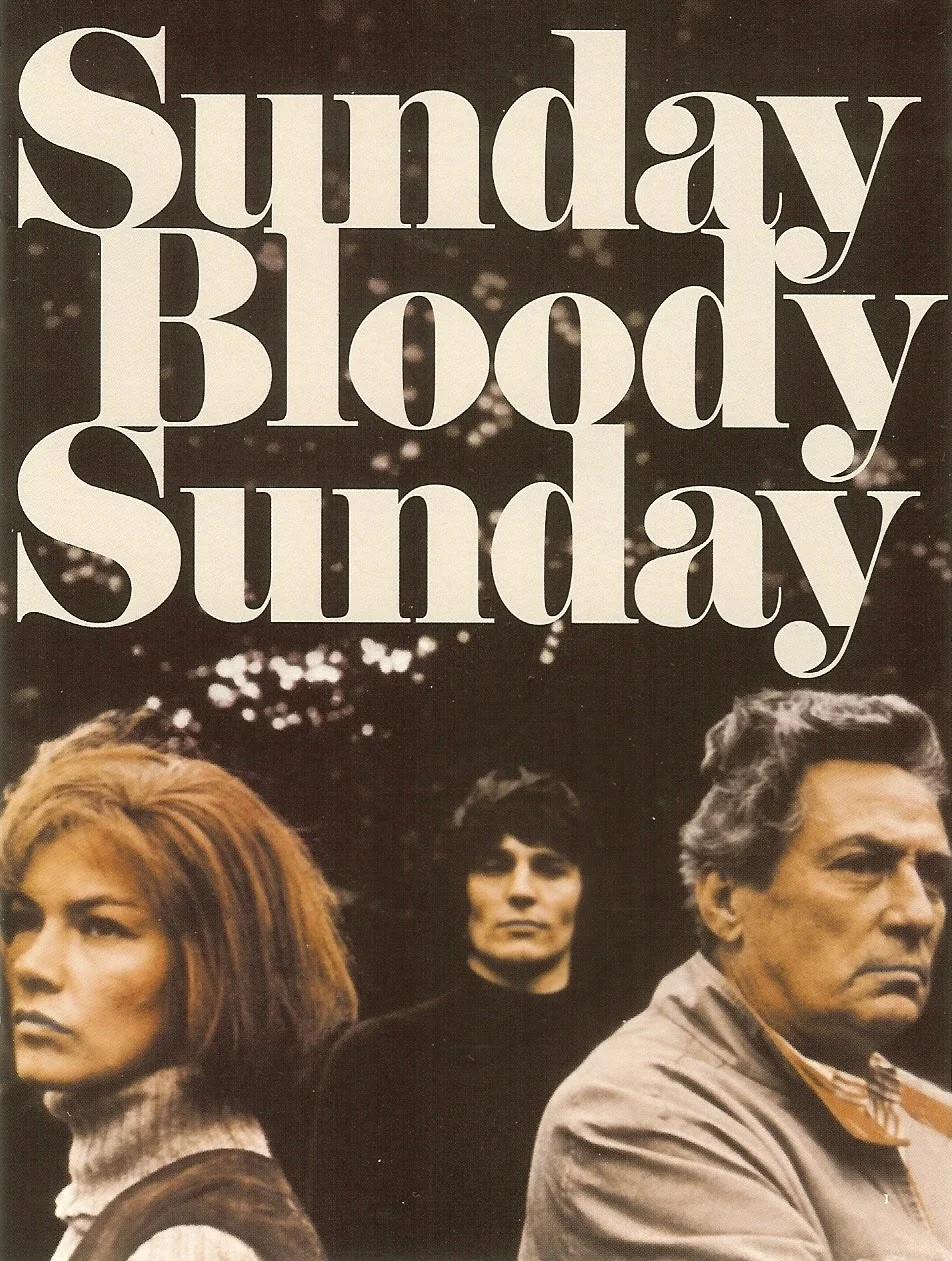 A lot of films tend to be largely driven by either the performances, the story, the director, the dialogue,
or the cinematography. Sunday Bloody Sunday is all of them. The pace has never been so lively. The
performances by Peter Finch, Glenda Jackson, and Murray Head are extraordinary and daring. These two male
actors put their careers on the line by taking a step further.
A lot of films tend to be largely driven by either the performances, the story, the director, the dialogue,
or the cinematography. Sunday Bloody Sunday is all of them. The pace has never been so lively. The
performances by Peter Finch, Glenda Jackson, and Murray Head are extraordinary and daring. These two male
actors put their careers on the line by taking a step further.
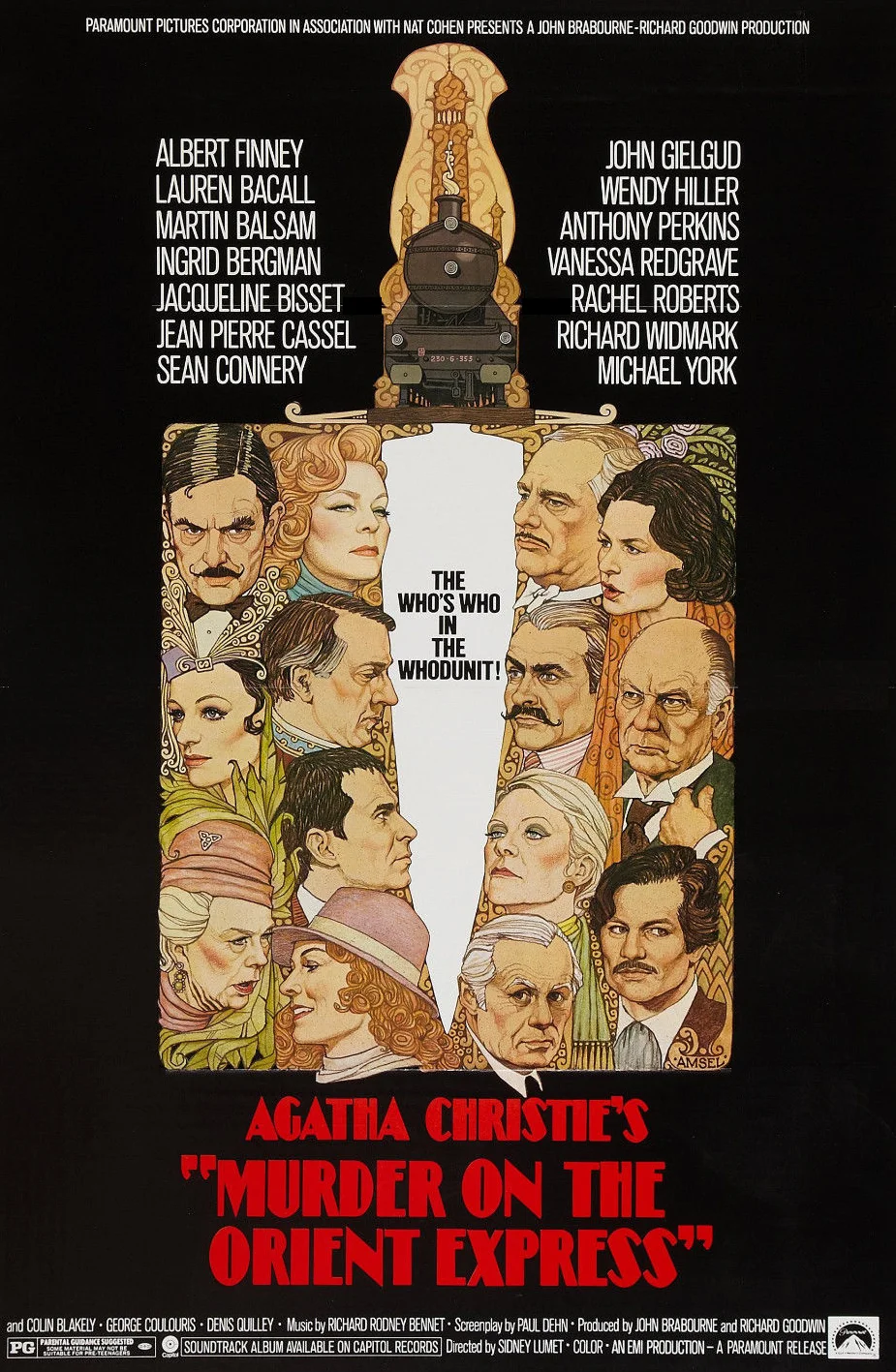 Murder on the Orient Express is completely star-studded (twenty-nine Oscar nominations and nine wins
including one honorary award), but nobody tops Albert Finney's performance. It's the only film adaptation
that Agatha Christie was satisfied with, and she's most pleased with Finney's portrayal of the famed detective
but didn't like his mustache.
Murder on the Orient Express is completely star-studded (twenty-nine Oscar nominations and nine wins
including one honorary award), but nobody tops Albert Finney's performance. It's the only film adaptation
that Agatha Christie was satisfied with, and she's most pleased with Finney's portrayal of the famed detective
but didn't like his mustache.
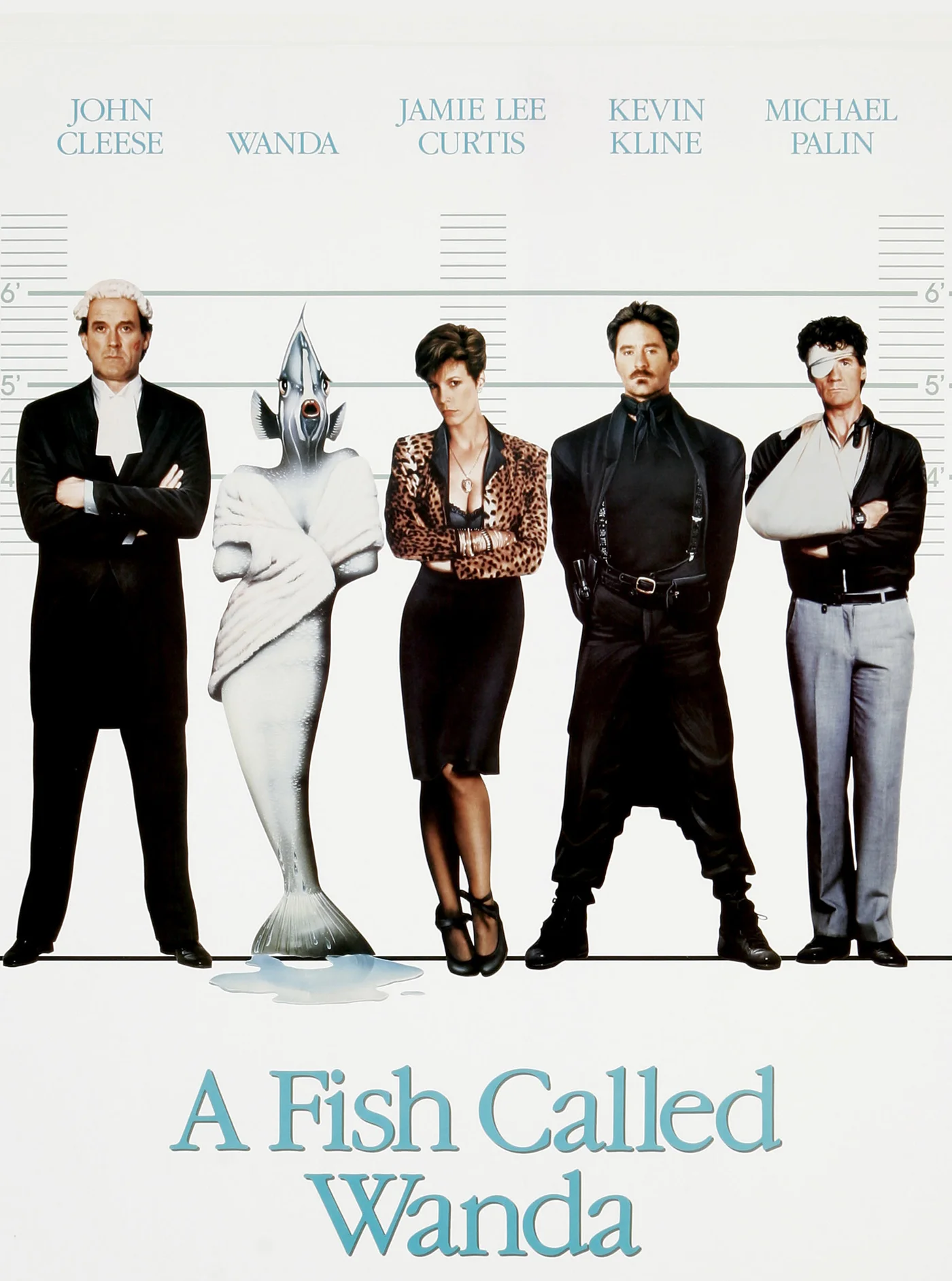 A Fish Called Wanda is one of the wackiest, funniest pictures made. Kevin Kline is beyond brilliant
as "Don't Call Me Stupid" Otto. "It's K-K-K-Ken! C-c-c-coming to k-k-k-kill me! How you gonna c-c-c-catch me,
K-K-K-Ken?" And the joke is on him. Jamie Lee Curtis, Michael Palin, and John Cleese are perfectly cast.
A Fish Called Wanda is one of the wackiest, funniest pictures made. Kevin Kline is beyond brilliant
as "Don't Call Me Stupid" Otto. "It's K-K-K-Ken! C-c-c-coming to k-k-k-kill me! How you gonna c-c-c-catch me,
K-K-K-Ken?" And the joke is on him. Jamie Lee Curtis, Michael Palin, and John Cleese are perfectly cast.
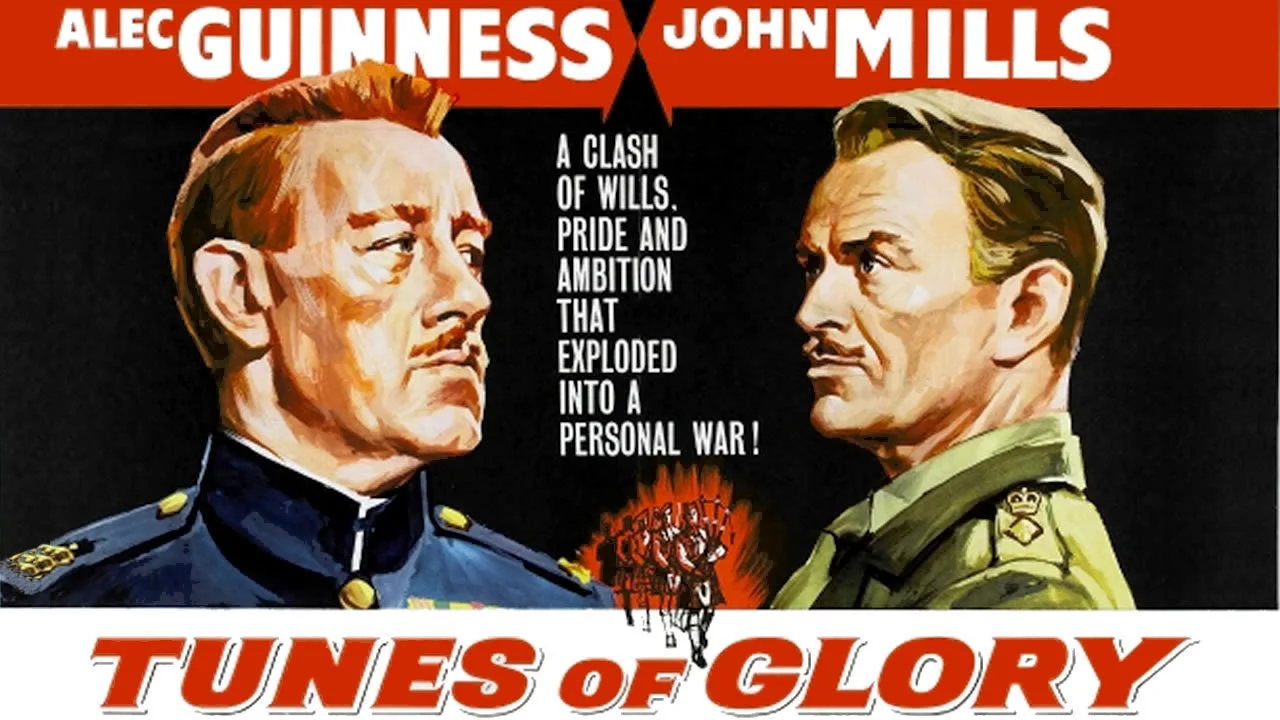 Tunes of Glory is a complicated British picture about the battle of personalities between two leaders
in the Scottish Highland Regiment. Alec Guinness shows why he was an outstanding actor of the time, and John
Mills is equally at his level, too.
Tunes of Glory is a complicated British picture about the battle of personalities between two leaders
in the Scottish Highland Regiment. Alec Guinness shows why he was an outstanding actor of the time, and John
Mills is equally at his level, too.
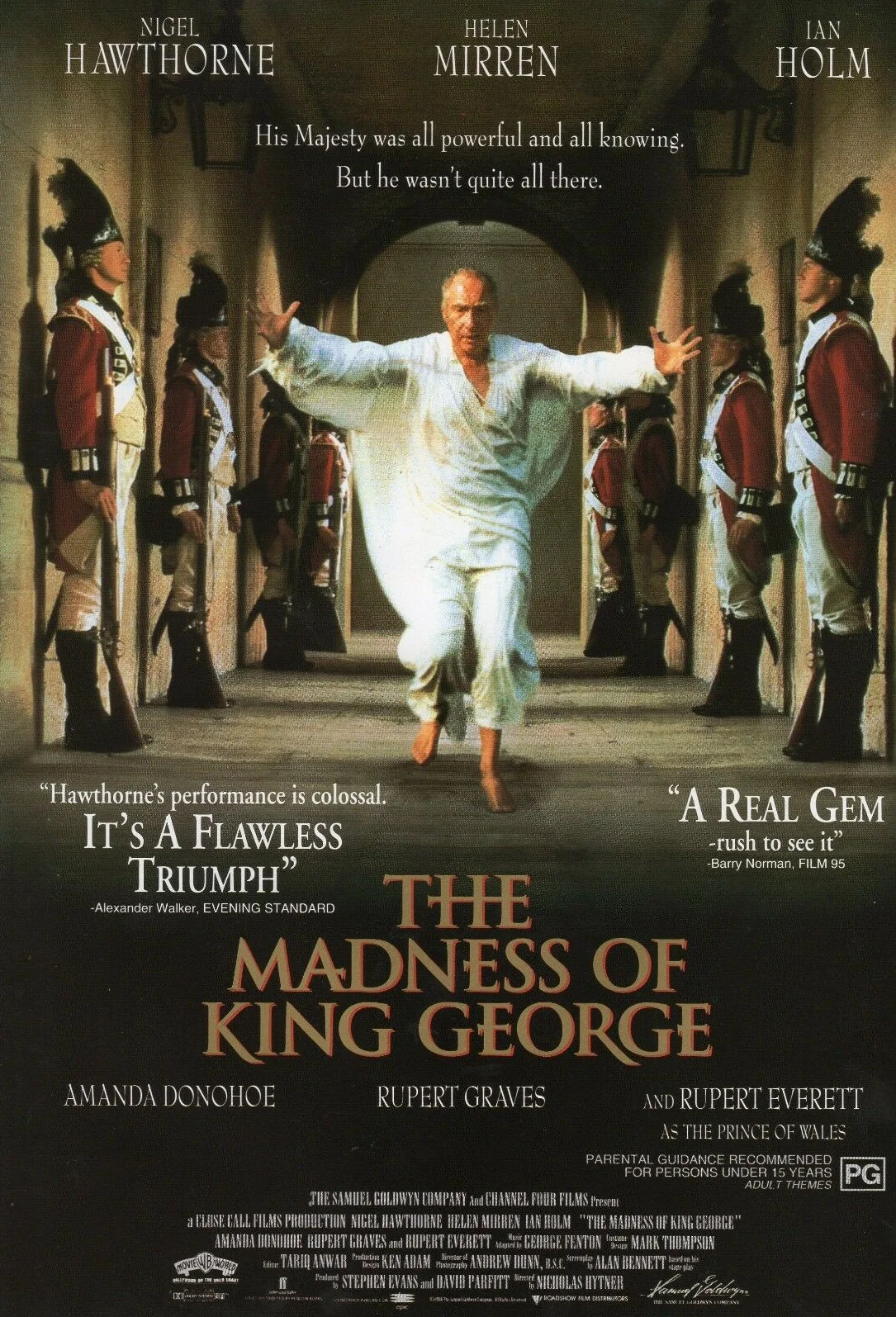 Great writing, great acting, and great story are all the hallmarks of The Madness of King George. The
Oscar-nominated Nigel Hawthorne is terrific. This one has a good sense of humor that's a play on a historical
fact, and it ends well with everybody going through a bad period of time while their loyalty has been put to test.
Great writing, great acting, and great story are all the hallmarks of The Madness of King George. The
Oscar-nominated Nigel Hawthorne is terrific. This one has a good sense of humor that's a play on a historical
fact, and it ends well with everybody going through a bad period of time while their loyalty has been put to test.
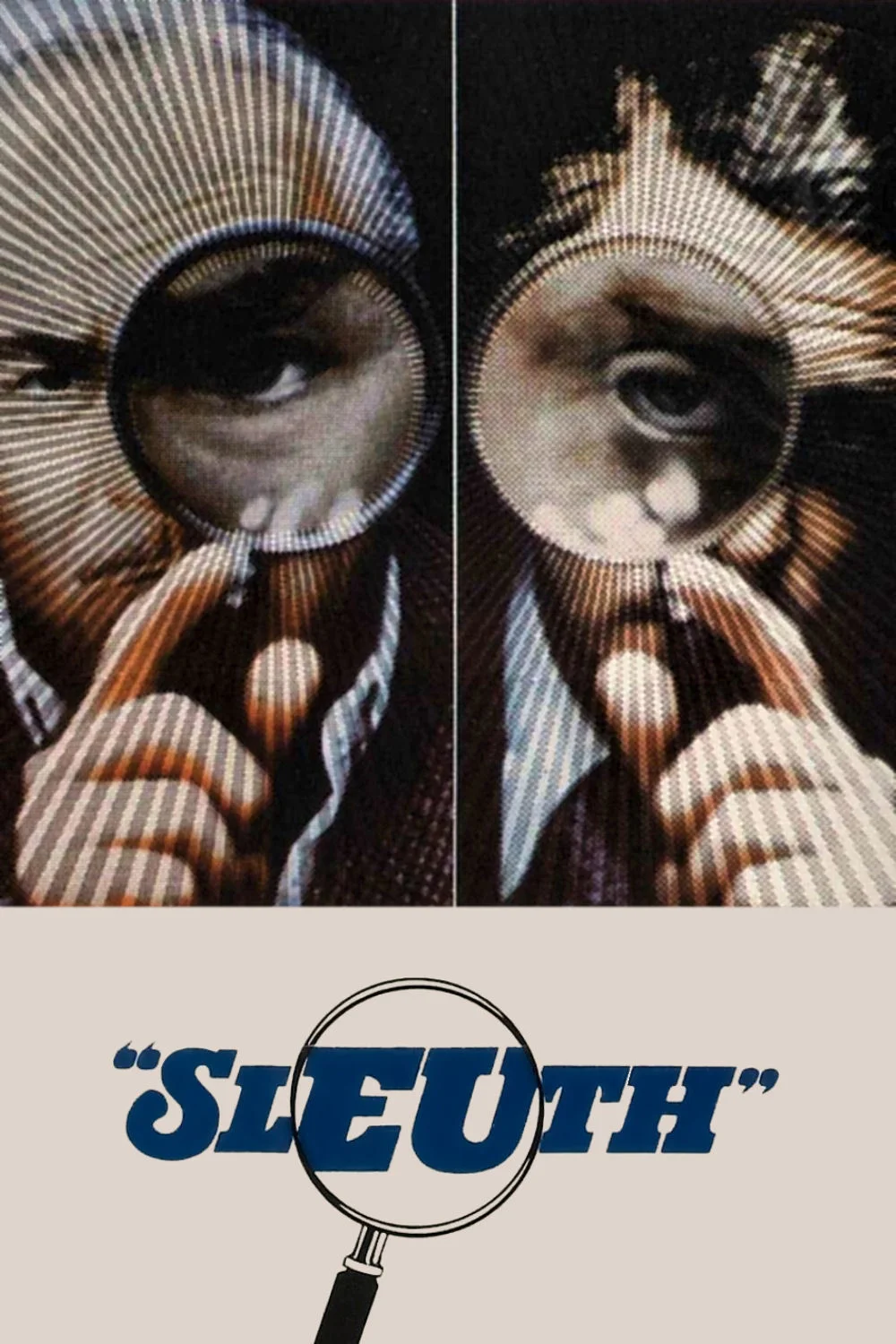 If there's such a thing as grading the difficulty of acting performances, Laurence Olivier and Michael Caine
will get a '10' for Sleuth. The complexity and challenge of the lines these two had to work with are
breathless. How they move themselves while handling props is brilliantly performed.
If there's such a thing as grading the difficulty of acting performances, Laurence Olivier and Michael Caine
will get a '10' for Sleuth. The complexity and challenge of the lines these two had to work with are
breathless. How they move themselves while handling props is brilliantly performed.
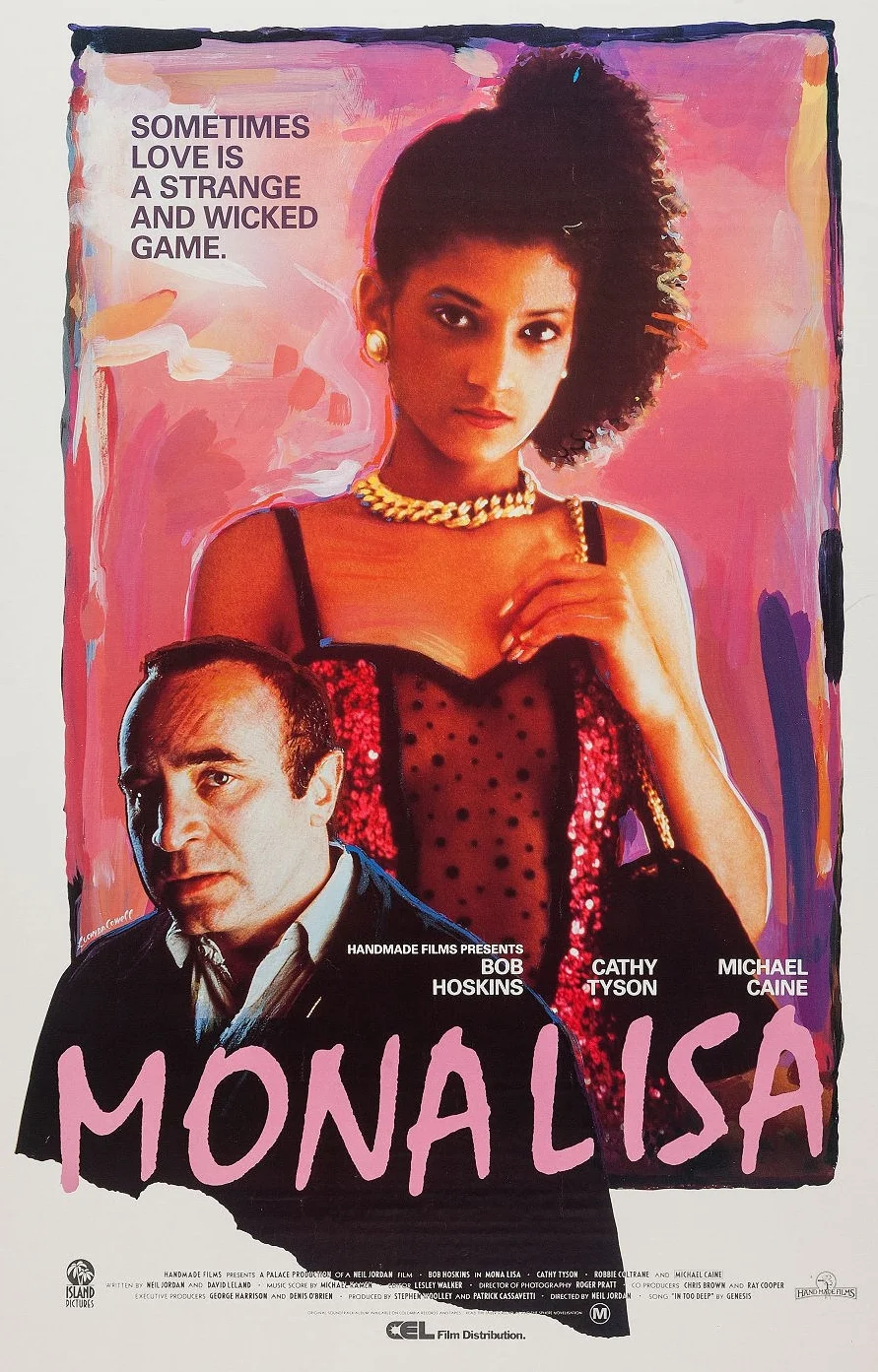 A delightful, if disturbing, British neo-noir picture with plenty of verve, Mona Lisa is Bob Hoskins'
show. As a reward, he was given an Oscar nomination. His character, George, is peculiar because he's a bulldog who
happens to be both stupid and naïve. Yet it's fascinating to watch him because of his volcanic temper.
A delightful, if disturbing, British neo-noir picture with plenty of verve, Mona Lisa is Bob Hoskins'
show. As a reward, he was given an Oscar nomination. His character, George, is peculiar because he's a bulldog who
happens to be both stupid and naïve. Yet it's fascinating to watch him because of his volcanic temper.
 You got to love Peter O'Toole and Richard Burton having meaty roles in the same film, and for them, it's
Becket. Their scenes are what moves this film very well. It received stupendous twelve Oscar nominations,
but the only winner here is Edward Anhalt for the adapted screenplay which is thoroughly deserving. If not for
his lines, Peter O'Toole would've never been on another planet.
You got to love Peter O'Toole and Richard Burton having meaty roles in the same film, and for them, it's
Becket. Their scenes are what moves this film very well. It received stupendous twelve Oscar nominations,
but the only winner here is Edward Anhalt for the adapted screenplay which is thoroughly deserving. If not for
his lines, Peter O'Toole would've never been on another planet.
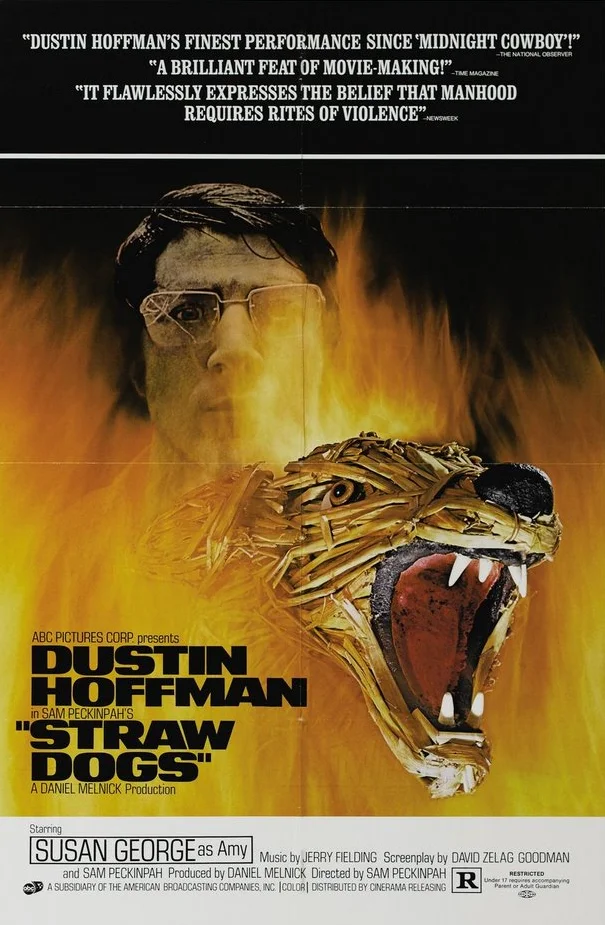 Straw Dogs is an unconventional violent work of art by Sam Peckinpah. Awesome performances are rendered,
most especially by Dustin Hoffman and Susan George. The tension is held high throughout the film, allowing it
to become a roller-coaster of highs and lows. Then, the violence just explodes like the cork out of a wine bottle.
Straw Dogs is an unconventional violent work of art by Sam Peckinpah. Awesome performances are rendered,
most especially by Dustin Hoffman and Susan George. The tension is held high throughout the film, allowing it
to become a roller-coaster of highs and lows. Then, the violence just explodes like the cork out of a wine bottle.
 Making his debut in a Hollywood film. Richard Burton steals the show from start to finish. He's brilliant and
impossible to overlook. Mad, bad, and dangerous to know, Richard Burton would've made a very good Heathcliff.
For his efforts, he was rewarded with an Oscar nomination, the first of seven.
Making his debut in a Hollywood film. Richard Burton steals the show from start to finish. He's brilliant and
impossible to overlook. Mad, bad, and dangerous to know, Richard Burton would've made a very good Heathcliff.
For his efforts, he was rewarded with an Oscar nomination, the first of seven.
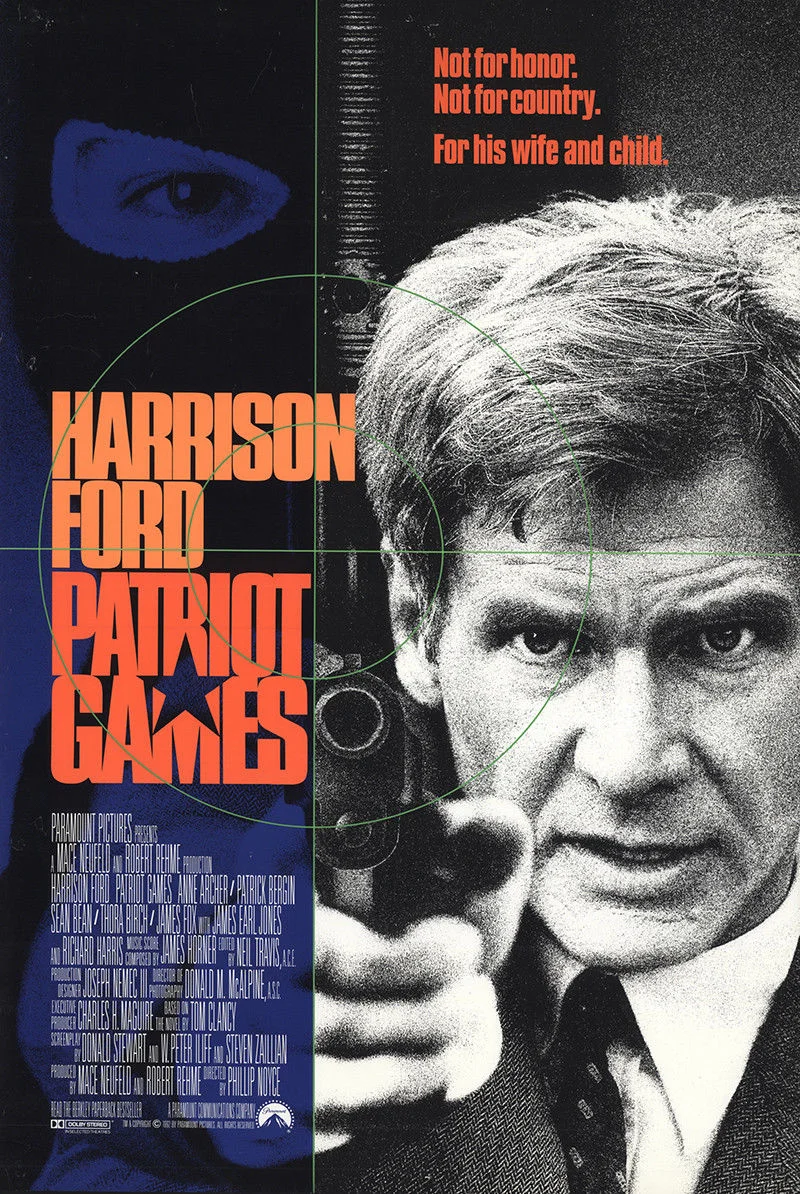 Patriot Games is a thrilling yarn by Tom Clancy with a new kind of action hero through Jack Ryan. It's
a unique American picture with lots of strong UK elements. Sean Bean will forever be remembered for this.
Harrison Ford has a great line when he confronted Richard Harris: "I will fucking destroy you." Cromwell was
certainly left shaking in his boots...or perhaps not.
Patriot Games is a thrilling yarn by Tom Clancy with a new kind of action hero through Jack Ryan. It's
a unique American picture with lots of strong UK elements. Sean Bean will forever be remembered for this.
Harrison Ford has a great line when he confronted Richard Harris: "I will fucking destroy you." Cromwell was
certainly left shaking in his boots...or perhaps not.
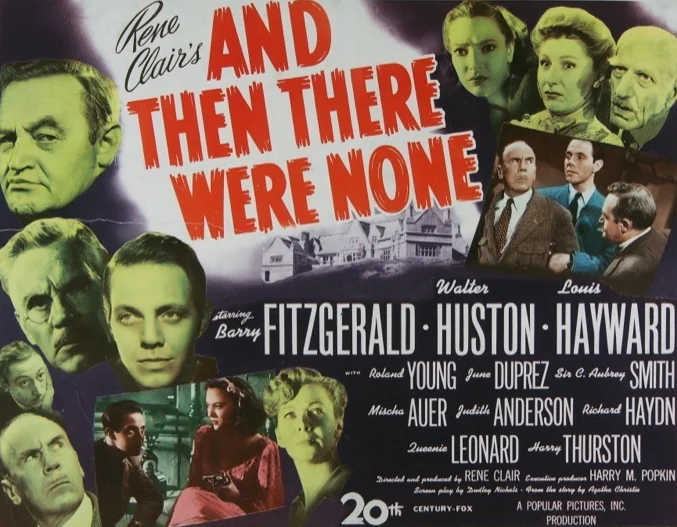 And Then There Were None is Agatha Christie's most famous book. One salient aspect that makes this a
through and through classic whodunnit picture is the quality of acting. Everybody has done a great job of
heightening the suspense.
And Then There Were None is Agatha Christie's most famous book. One salient aspect that makes this a
through and through classic whodunnit picture is the quality of acting. Everybody has done a great job of
heightening the suspense.
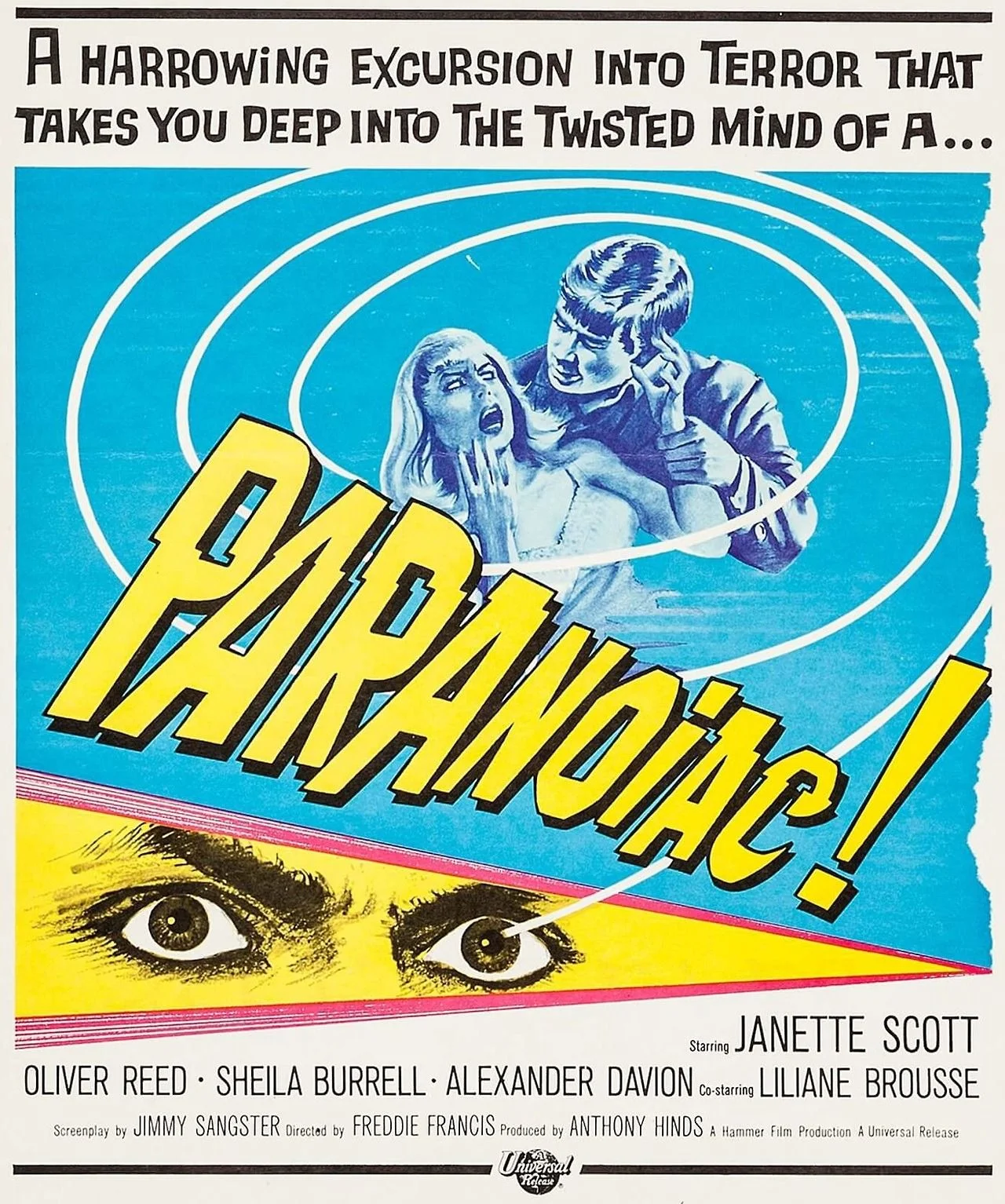 Dark, brooding, combative, sexy, and absolutely talented, Oliver Reed, once upon a time, was the rage of
British cinema. The most underrated Hammer Horror picture ever made, Paranoiac is a wonderful treat for
fans and newcomers alike. Oliver Reed is drop-dead gorgeous in black and white, and it's hard to take eyes off him.
Dark, brooding, combative, sexy, and absolutely talented, Oliver Reed, once upon a time, was the rage of
British cinema. The most underrated Hammer Horror picture ever made, Paranoiac is a wonderful treat for
fans and newcomers alike. Oliver Reed is drop-dead gorgeous in black and white, and it's hard to take eyes off him.
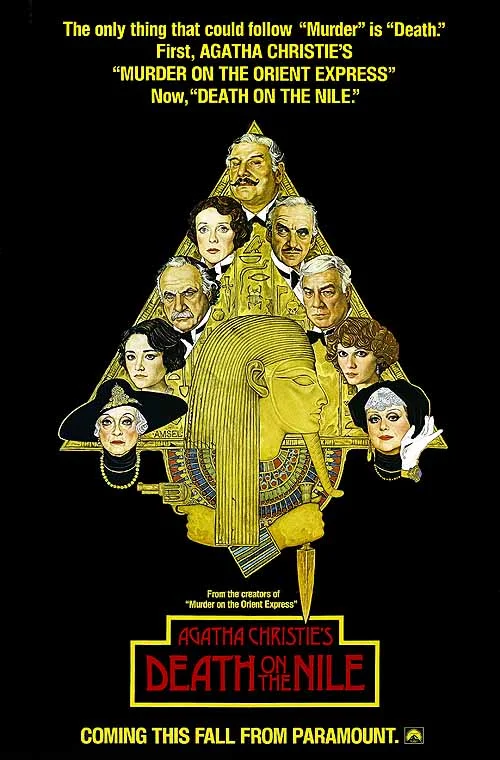 Murder on the Orient Express is the one that restarted the cycle of whodunnit pictures, and here comes
along Death on the Nile four years later. The true treat of such pictures is an all-star cast which is 28
Oscar nominations with eight wins and one Honorary Oscar among them. It's also hard to go wrong with an Anthony
Shaffer screenplay.
Murder on the Orient Express is the one that restarted the cycle of whodunnit pictures, and here comes
along Death on the Nile four years later. The true treat of such pictures is an all-star cast which is 28
Oscar nominations with eight wins and one Honorary Oscar among them. It's also hard to go wrong with an Anthony
Shaffer screenplay.
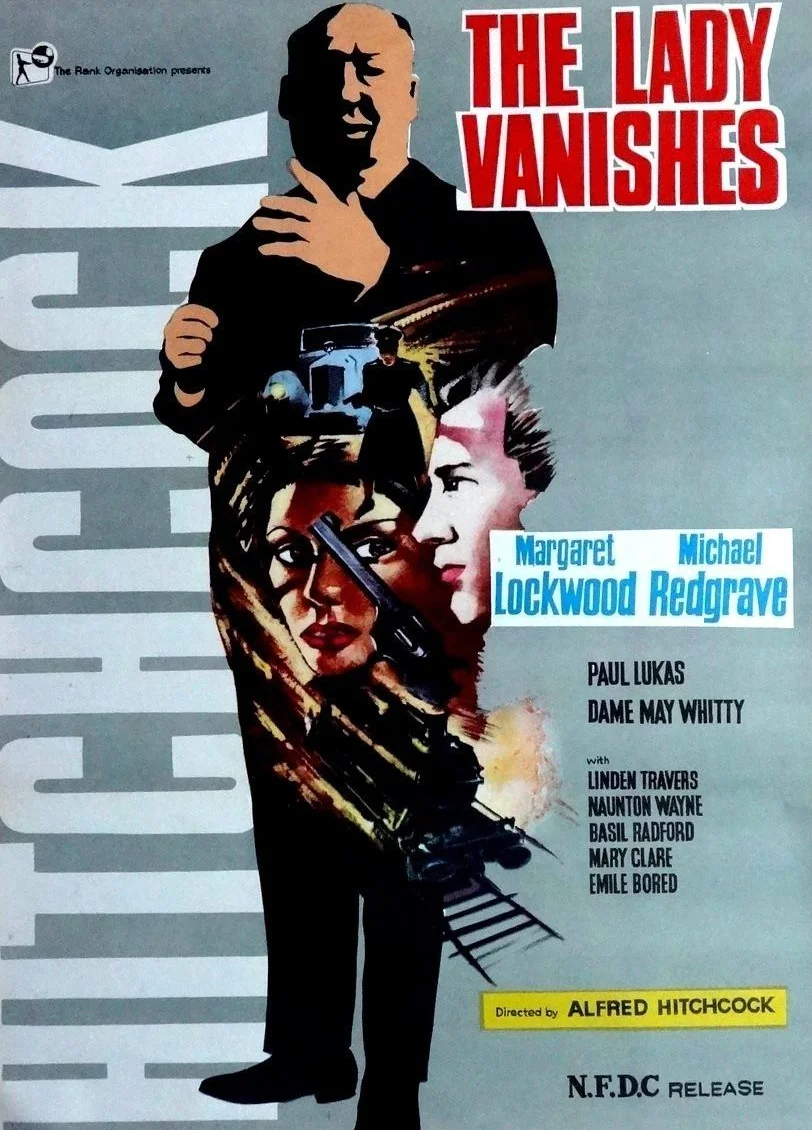 No matter how much The Lady Vanishes resembles The 39 Steps, it's still a Hitchcock-worthy picture.
What carries the show well is the marvelous pairings of Basil Radford and Naunton Wayne as the cricket
enthusiasts, Charters and Caldicott, and Margaret Lockwood and Michael Redgrave.
No matter how much The Lady Vanishes resembles The 39 Steps, it's still a Hitchcock-worthy picture.
What carries the show well is the marvelous pairings of Basil Radford and Naunton Wayne as the cricket
enthusiasts, Charters and Caldicott, and Margaret Lockwood and Michael Redgrave.
 Daphne Du Maurier wrote Rebecca, and Alfred Hitchcock used his technical brilliance to transform the book
into an outstanding picture. The performances by Laurence Olivier and Joan Fontaine are excellent. It's really
she who makes the most of it, envoking suggestions of Ingrid Bergman-Casablanca moments.
Daphne Du Maurier wrote Rebecca, and Alfred Hitchcock used his technical brilliance to transform the book
into an outstanding picture. The performances by Laurence Olivier and Joan Fontaine are excellent. It's really
she who makes the most of it, envoking suggestions of Ingrid Bergman-Casablanca moments.
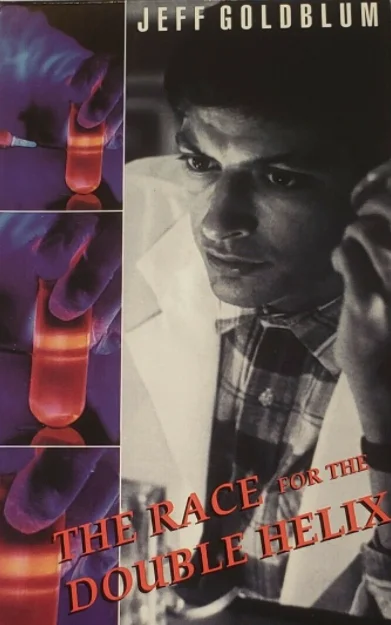 If you want to see an inspiring story, look no further than The Race for the Double Helix. It was truly
a race during the 50's that earned three men (James Watson, Francis Crick, and Maurice Wilkins) the Nobel Prize
although Rosalind Franklin should also have been awarded it posthumously. The last ten minutes is what makes the
film which is dramatic.
If you want to see an inspiring story, look no further than The Race for the Double Helix. It was truly
a race during the 50's that earned three men (James Watson, Francis Crick, and Maurice Wilkins) the Nobel Prize
although Rosalind Franklin should also have been awarded it posthumously. The last ten minutes is what makes the
film which is dramatic.
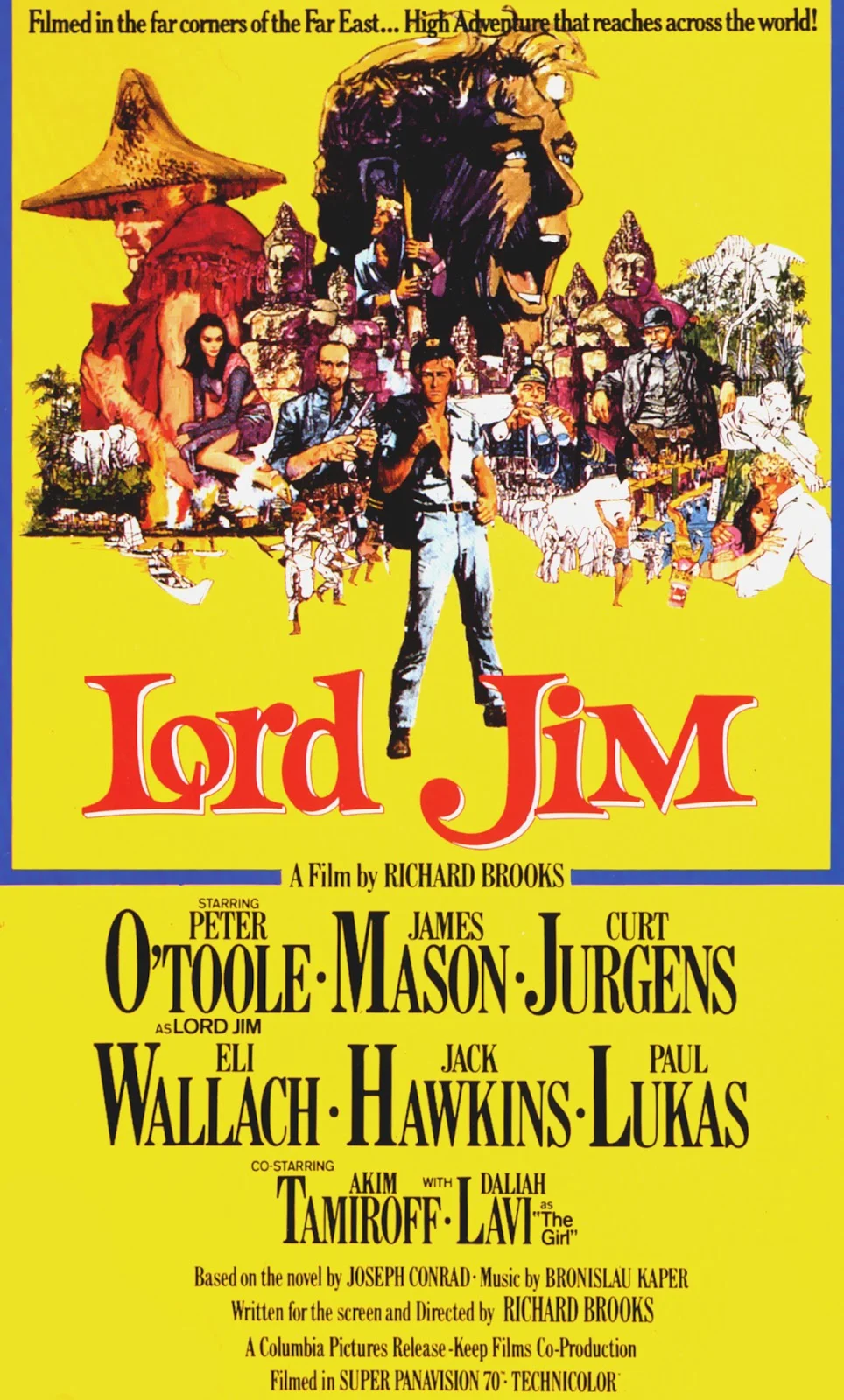 If you can't get enough of Peter O'Toole in Lawrence of Arabia, then make Lord Jim your next fix.
He can act and is assuredly capable of leading an epic. Freddie Young did the cinematography for
Lawrence of Arabia and does it again for Lord Jim which is incredible. Because of Joseph Conrad's
writing, parts of the film are reminiscent of Apocalypse Now.
If you can't get enough of Peter O'Toole in Lawrence of Arabia, then make Lord Jim your next fix.
He can act and is assuredly capable of leading an epic. Freddie Young did the cinematography for
Lawrence of Arabia and does it again for Lord Jim which is incredible. Because of Joseph Conrad's
writing, parts of the film are reminiscent of Apocalypse Now.
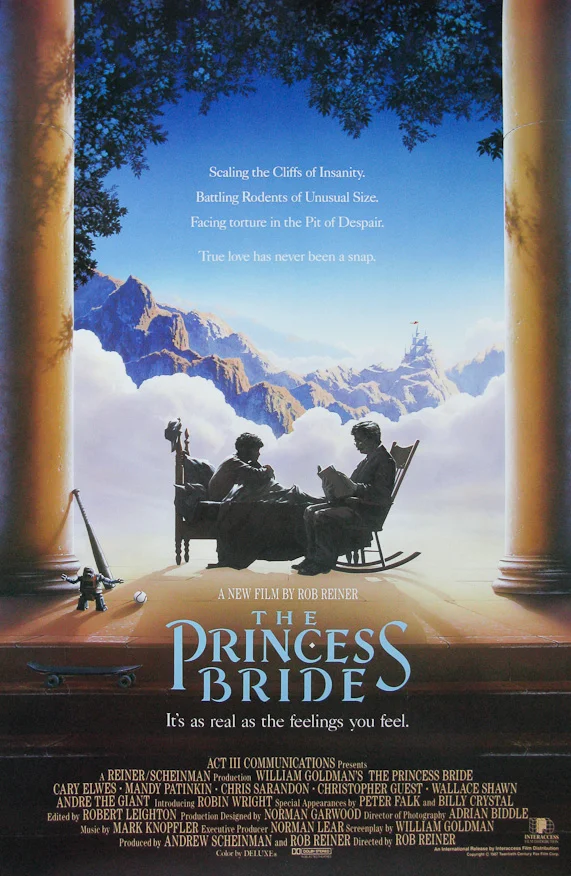 The Princess Bride is memorable for being a great fantasy picture which was shot on location in England
and Ireland. What I love about it is the setup: the storytelling format, the voice-over
narration, the actual tale, and the occasional interruptions by the grandson. They all make the movie special.
In fact, The Princess Bride is the best example to demonstrate the love of books.
The Princess Bride is memorable for being a great fantasy picture which was shot on location in England
and Ireland. What I love about it is the setup: the storytelling format, the voice-over
narration, the actual tale, and the occasional interruptions by the grandson. They all make the movie special.
In fact, The Princess Bride is the best example to demonstrate the love of books.
 Buoyed by the well-done English cinematography, Peeping Tom is the kind of film Alfred Hitchcock could've
directed, but kudos to Michael Powell. The idea of breeding freakish traits for the boy is the most fascinating
part of the film. Karlheinz Böhm showcases a good, if unconventional, display of acting.
Buoyed by the well-done English cinematography, Peeping Tom is the kind of film Alfred Hitchcock could've
directed, but kudos to Michael Powell. The idea of breeding freakish traits for the boy is the most fascinating
part of the film. Karlheinz Böhm showcases a good, if unconventional, display of acting.
 Four Weddings and a Funeral is the one that made Hugh Grant a household name. He has a knack for showing
off his boyishness personality. Andie MacDowell and Kristin Scott Thomas are also excellent. What a chemistry
among the cast. The funniest of them all is Rowan Atkinson. The cinematography is pleasantly done with wonderful
location shots in England and Scotland.
Four Weddings and a Funeral is the one that made Hugh Grant a household name. He has a knack for showing
off his boyishness personality. Andie MacDowell and Kristin Scott Thomas are also excellent. What a chemistry
among the cast. The funniest of them all is Rowan Atkinson. The cinematography is pleasantly done with wonderful
location shots in England and Scotland.
 Before there was James Cameron's Titanic, there was A Night to Remember that's based on the book
by Walter Lord. Comparisons between both of these films are simply unavoidable. However, the director does a
good job of creating a buildup that's similar to From Here to Eternity before the disaster strikes. It
remains the most accurate version of what happened that night of April 14, 1912.
Before there was James Cameron's Titanic, there was A Night to Remember that's based on the book
by Walter Lord. Comparisons between both of these films are simply unavoidable. However, the director does a
good job of creating a buildup that's similar to From Here to Eternity before the disaster strikes. It
remains the most accurate version of what happened that night of April 14, 1912.
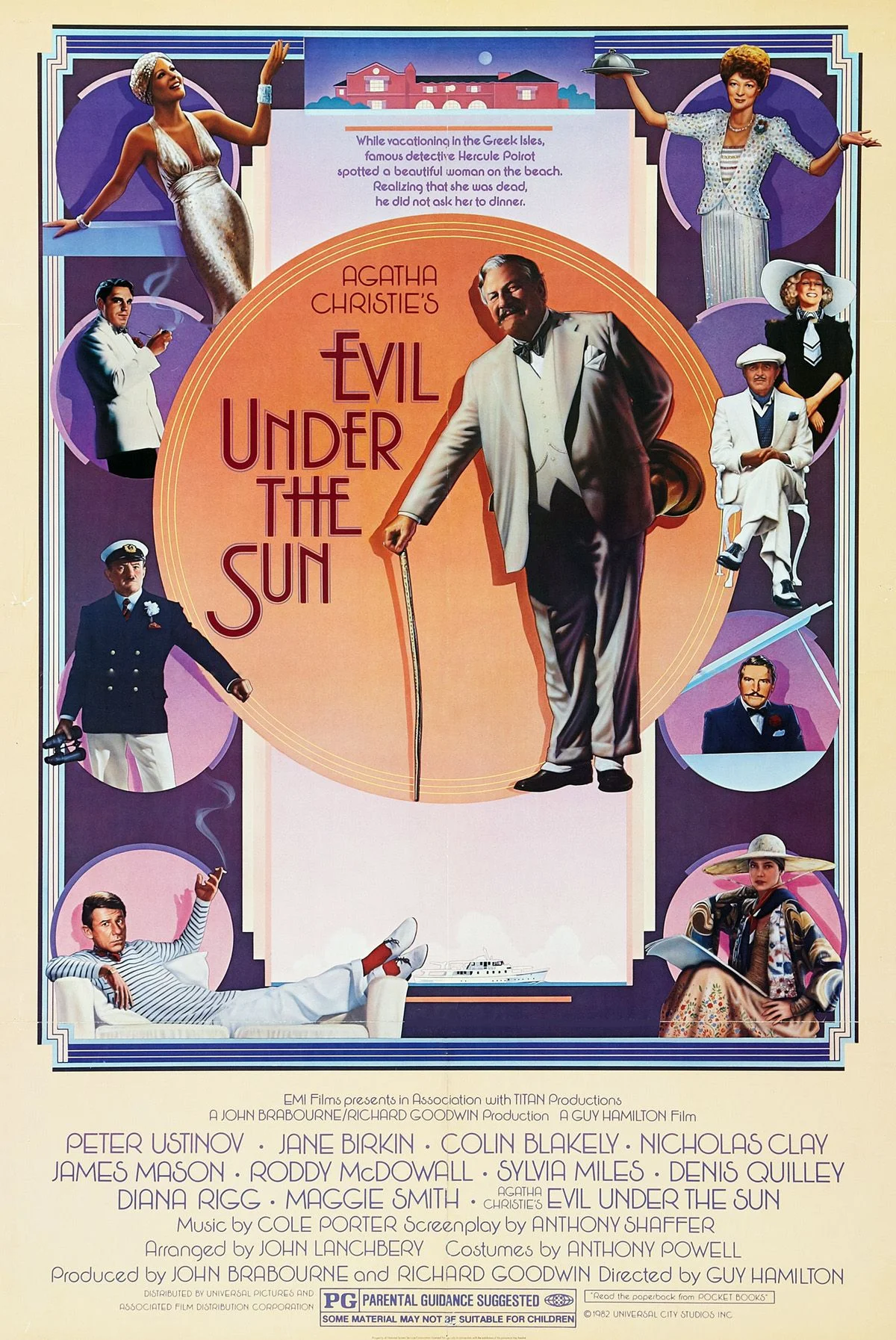 The cinematography of Spain's Balearic Islands including Majorca (which is also called Mallorca) is amazing.
This time, the Agatha Christie mystery is pretty hard to solve, so when Hercule Poirot explained how the murder
happened, it's ingenious. So, kudos to Anthony Shaffer again for penning a clear screenplay.
The cinematography of Spain's Balearic Islands including Majorca (which is also called Mallorca) is amazing.
This time, the Agatha Christie mystery is pretty hard to solve, so when Hercule Poirot explained how the murder
happened, it's ingenious. So, kudos to Anthony Shaffer again for penning a clear screenplay.
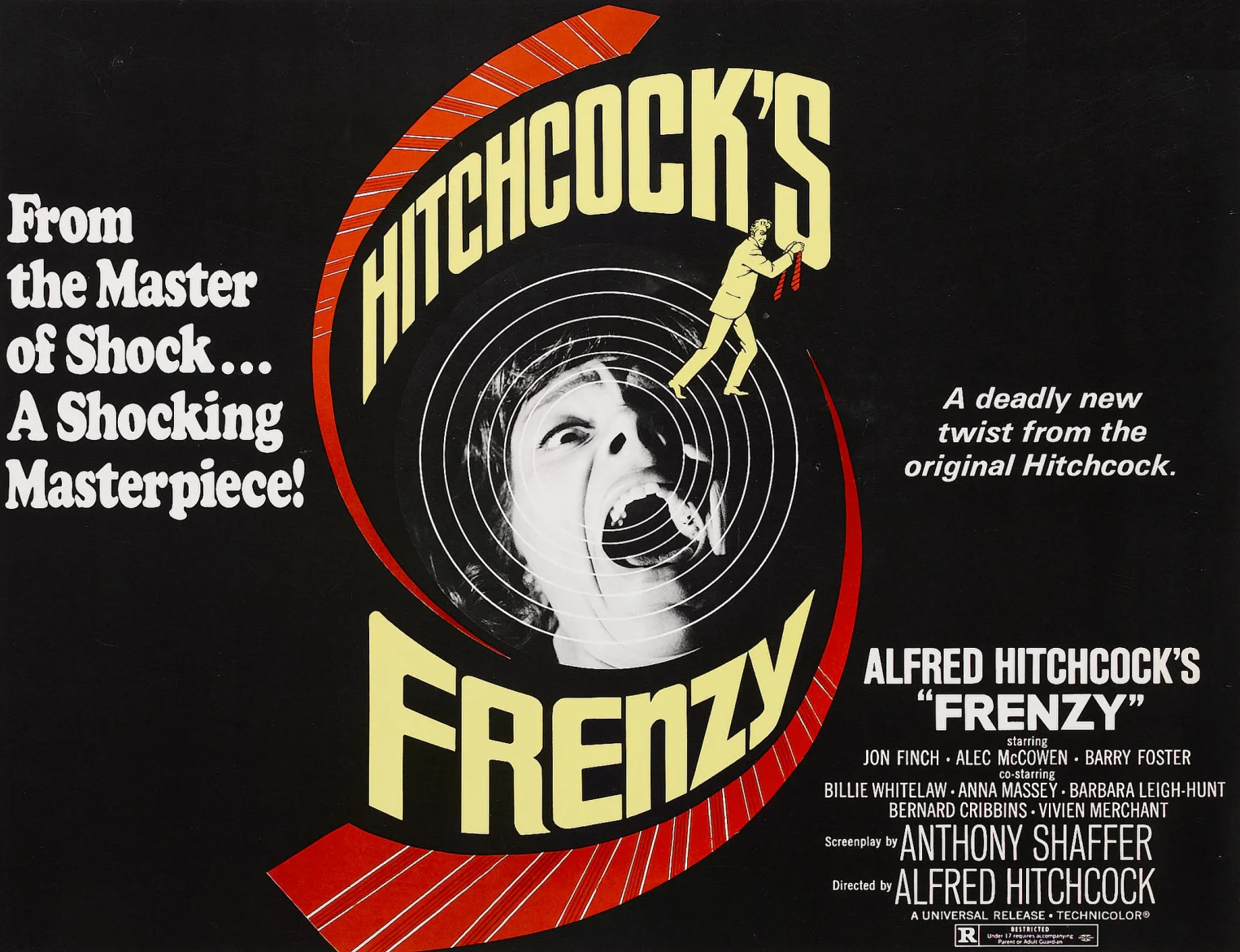 "From the Master of Shock...a Shocking Masterpiece!" is the tagline for Frenzy. It's a well-made
Hitchcock picture, and for the first time ever, this one was slapped with an R rating for nudity and graphic
scenes. Barry Foster is brilliant as the sex maniac killer Robert Rusk.
"From the Master of Shock...a Shocking Masterpiece!" is the tagline for Frenzy. It's a well-made
Hitchcock picture, and for the first time ever, this one was slapped with an R rating for nudity and graphic
scenes. Barry Foster is brilliant as the sex maniac killer Robert Rusk.
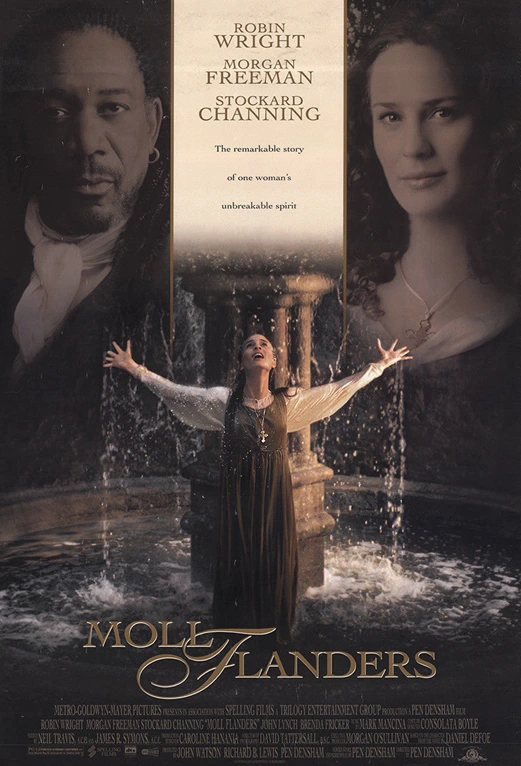 This is really Robin Wright's film. She gives a commendable performance as the strong-willed heroine who puts
up with the hard conditions and finally sees the light at the end to get out of her desperate situation. In
other words, it's a classic story of one's fall and eventual redemption (think of The Count of Monte Cristo).
On top of first-rate costumes and wonderful cinematography, the supporting cast elevates the material as well,
and extra points go to Stockard Channing, Morgan Freeman, and John Lynch.
This is really Robin Wright's film. She gives a commendable performance as the strong-willed heroine who puts
up with the hard conditions and finally sees the light at the end to get out of her desperate situation. In
other words, it's a classic story of one's fall and eventual redemption (think of The Count of Monte Cristo).
On top of first-rate costumes and wonderful cinematography, the supporting cast elevates the material as well,
and extra points go to Stockard Channing, Morgan Freeman, and John Lynch.
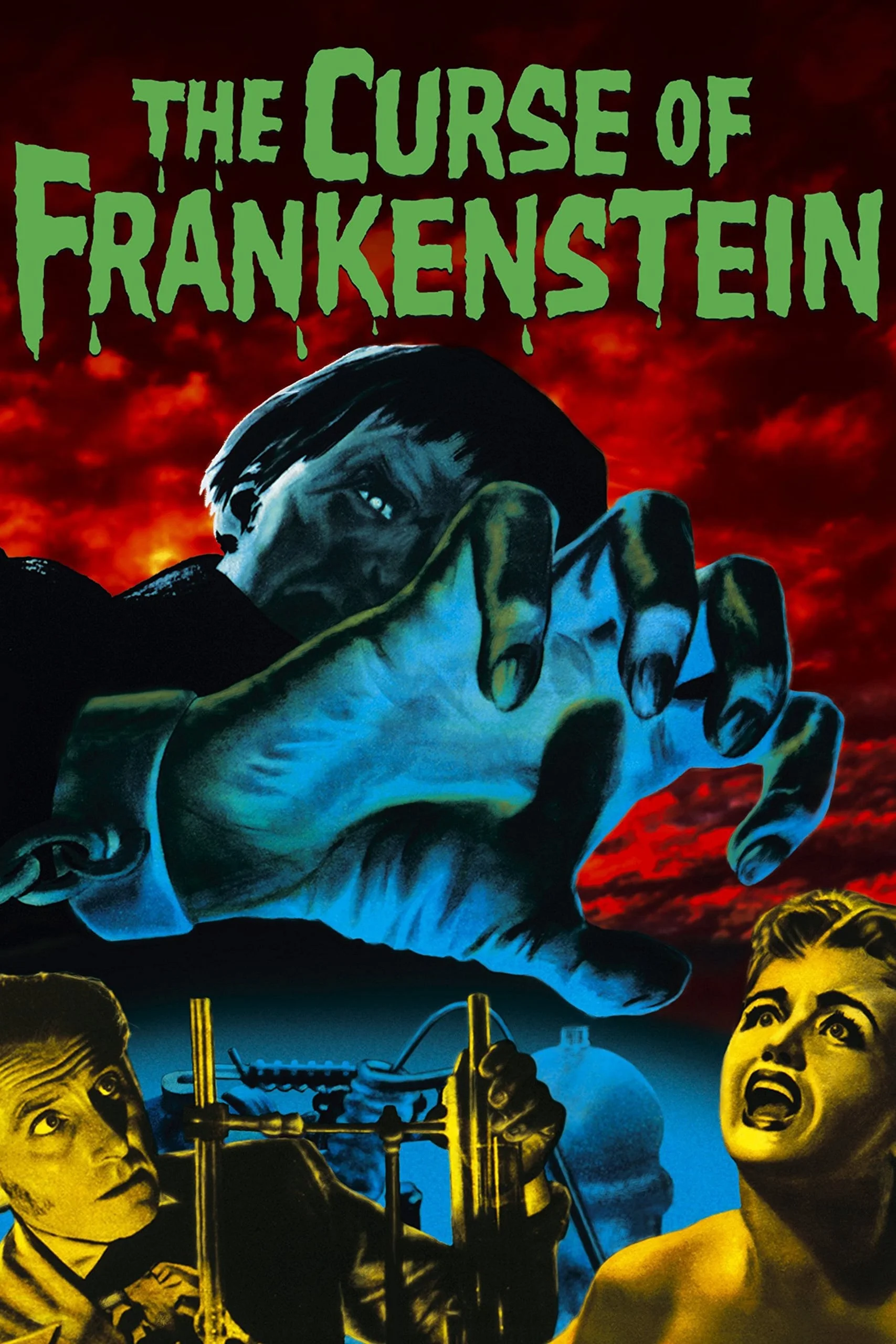 A sensational Hammer Horror picture, The Curse of Frankenstein has beautiful colors and adapts well to
the 19th century style. Before it was made, horror films were tame and primitive, but this one went a notch
above the usual by showcasing many features that weren't seen before, especially in color.
A sensational Hammer Horror picture, The Curse of Frankenstein has beautiful colors and adapts well to
the 19th century style. Before it was made, horror films were tame and primitive, but this one went a notch
above the usual by showcasing many features that weren't seen before, especially in color.
 The performances by Rita Tushingham, Murray Melvin, and Dora Bryan are outstanding with the first two making
their screen debuts, resulting in Best Acting awards at the Cannes Film Festival. They can thank Walter
Lassally for the stunning black-and-white cinematography. Consider the year that the film was made in
which was 1961. Hollywood didn't start doing this type of movies until the late 60's; all the big studios
did was produce fluff and people got tired of it, hence the decline in ticket sales, because nothing
they saw was either real or relatable.
The performances by Rita Tushingham, Murray Melvin, and Dora Bryan are outstanding with the first two making
their screen debuts, resulting in Best Acting awards at the Cannes Film Festival. They can thank Walter
Lassally for the stunning black-and-white cinematography. Consider the year that the film was made in
which was 1961. Hollywood didn't start doing this type of movies until the late 60's; all the big studios
did was produce fluff and people got tired of it, hence the decline in ticket sales, because nothing
they saw was either real or relatable.
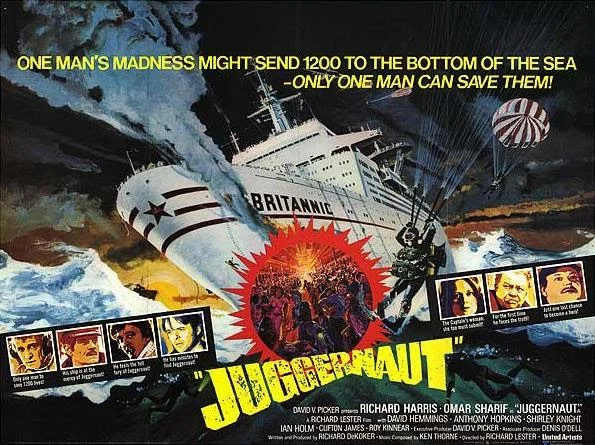 Think of Juggernaut as a cross between Titanic and Blown Away. Richard Harris gives a
fabulous performance as Fallon the undefeated champion, having defused many bombs throughout his career. The
latest act of terrorism proves to be his toughest challenge yet. It's what makes the movie go.
Think of Juggernaut as a cross between Titanic and Blown Away. Richard Harris gives a
fabulous performance as Fallon the undefeated champion, having defused many bombs throughout his career. The
latest act of terrorism proves to be his toughest challenge yet. It's what makes the movie go.
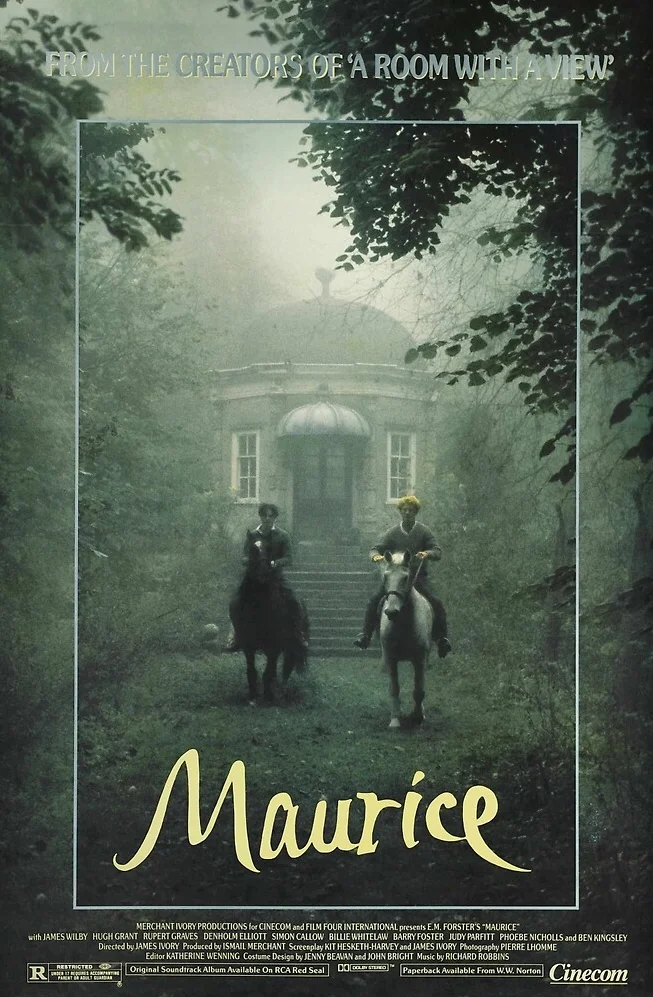 Maurice is a Merchant Ivory production that's based on E.M. Forster's eponymous novel which was held
back for publication until after his death due to tabooness of the subject: male homosexuality. The best feature
is the cinematography, and the costumes are elegantly designed. James Wilby and Hugh Grant score extra points
for their intrepidity by taking the step to play homosexual lovers.
Maurice is a Merchant Ivory production that's based on E.M. Forster's eponymous novel which was held
back for publication until after his death due to tabooness of the subject: male homosexuality. The best feature
is the cinematography, and the costumes are elegantly designed. James Wilby and Hugh Grant score extra points
for their intrepidity by taking the step to play homosexual lovers.
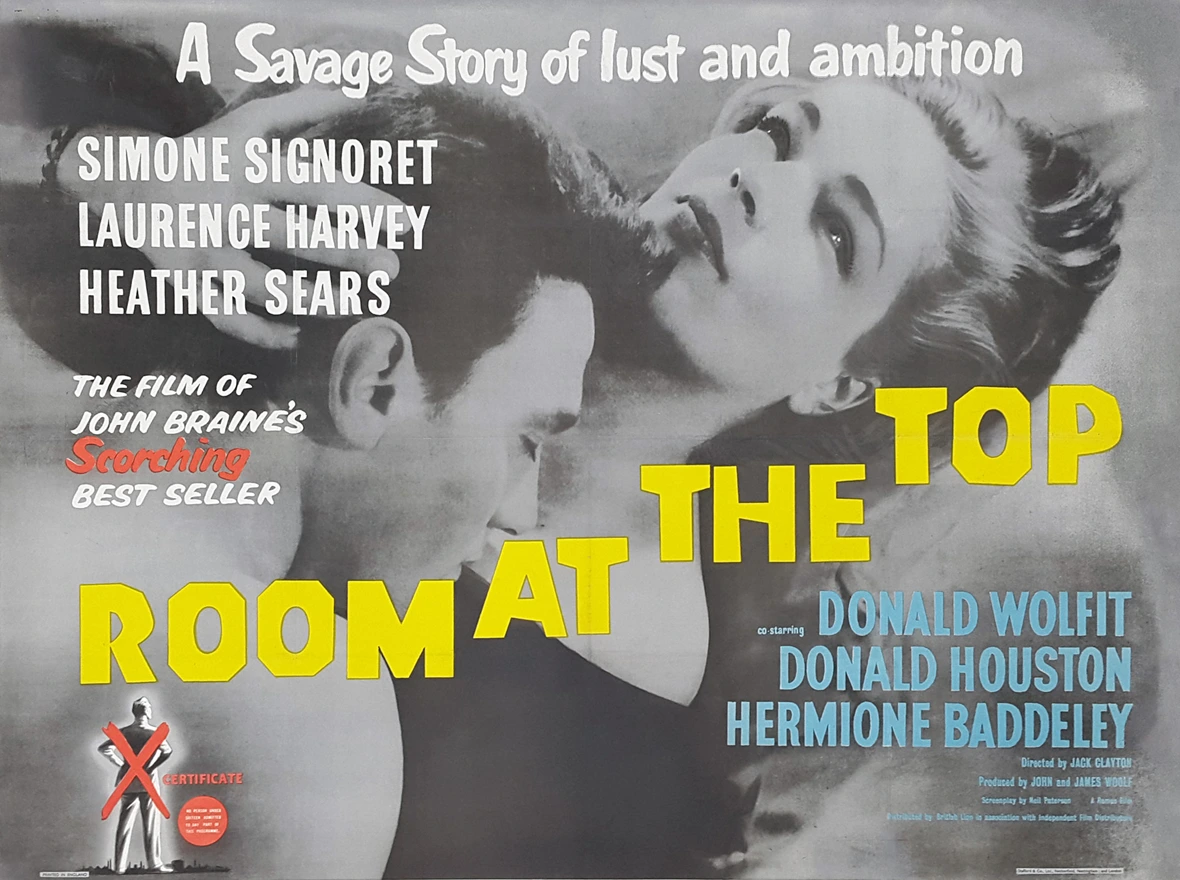 The film is responsible for initiating the British New Wave by blowing up adultery big time, hence the 'X'
certificate. It's a strong picture because of the Oscar-winning adapted screenplay by Neil Paterson and Freddie
Francis' stunning black-and-white photography. The performances are impeccable, most especially by Laurence
Harvey and Simone Signoret.
The film is responsible for initiating the British New Wave by blowing up adultery big time, hence the 'X'
certificate. It's a strong picture because of the Oscar-winning adapted screenplay by Neil Paterson and Freddie
Francis' stunning black-and-white photography. The performances are impeccable, most especially by Laurence
Harvey and Simone Signoret.
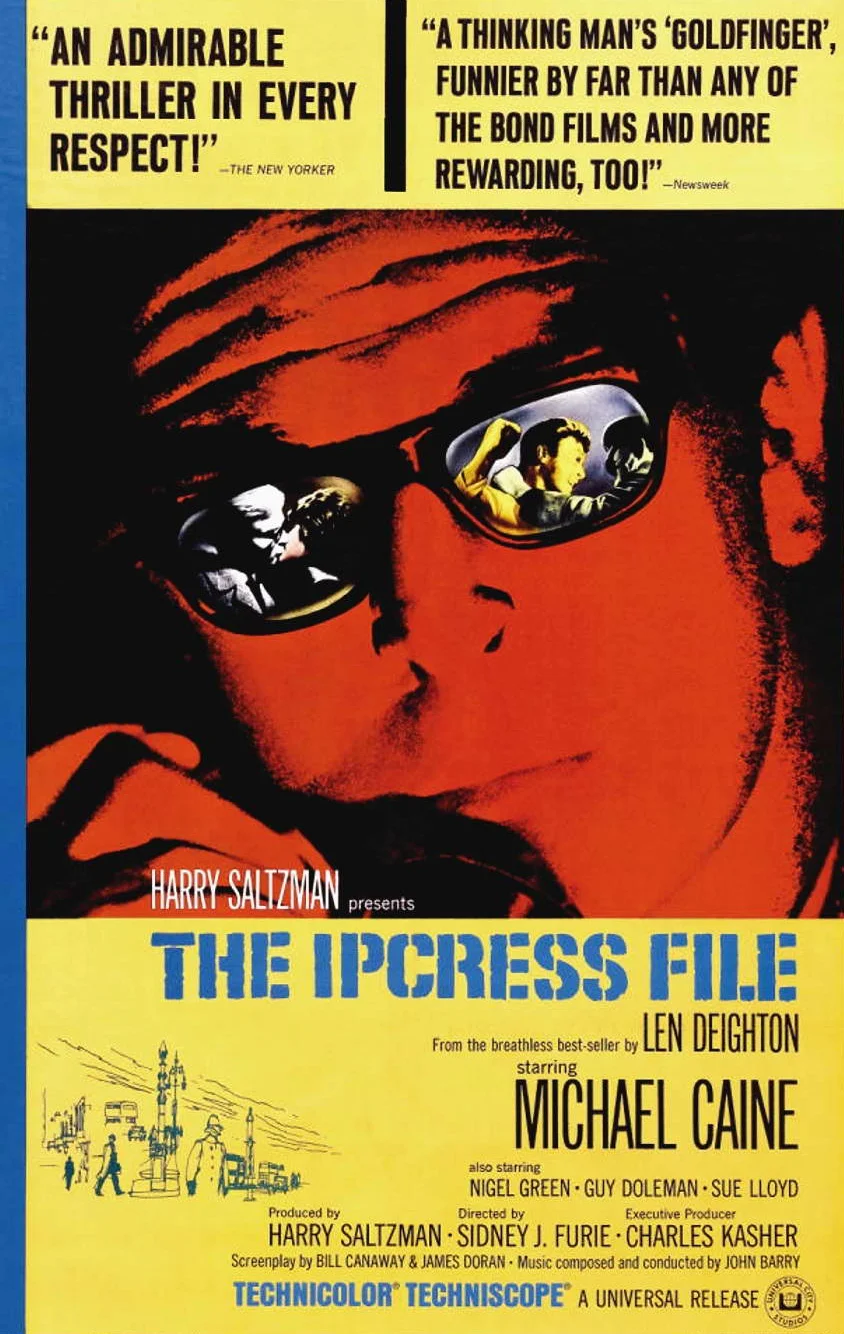 It's not that the script is complicated, but it's rather tightly controlled, refusing to give any inch.
You'll have to sit through The Ipcress File all the way to the end and get the explanation of what the
plot is about. The most valuable asset is the avant-garde camera work. If not for that, it would've been a dated
spy picture. The dialogue is very concise and to the point. Michael Caine as Harry Palmer is heaven, and Nigel
Green is great as well.
It's not that the script is complicated, but it's rather tightly controlled, refusing to give any inch.
You'll have to sit through The Ipcress File all the way to the end and get the explanation of what the
plot is about. The most valuable asset is the avant-garde camera work. If not for that, it would've been a dated
spy picture. The dialogue is very concise and to the point. Michael Caine as Harry Palmer is heaven, and Nigel
Green is great as well.
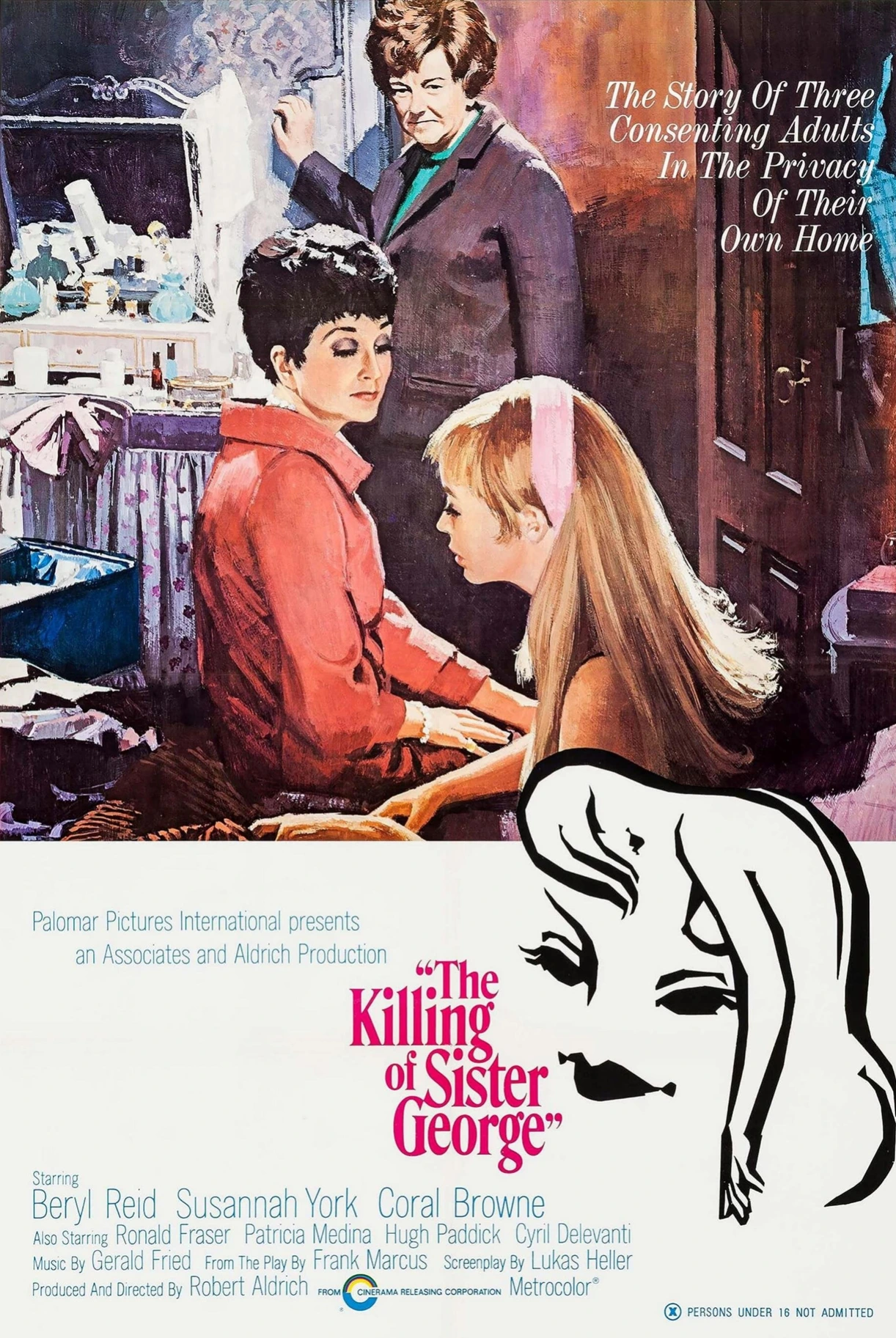 Despite being totally forgotten, The Killing of Sister George has a reputation. What a total surprise
that Beryl Reid, Susannah York (who's way, way better than Julie Christie), and Coral Browne weren't
Oscar-nominated. That has to be the best performance of their careers. Is it because of the controversial
content? For 1968, the lesbianism must have been shocking to see on screen.
Despite being totally forgotten, The Killing of Sister George has a reputation. What a total surprise
that Beryl Reid, Susannah York (who's way, way better than Julie Christie), and Coral Browne weren't
Oscar-nominated. That has to be the best performance of their careers. Is it because of the controversial
content? For 1968, the lesbianism must have been shocking to see on screen.
 What helps a great deal is the stylish black-and-white photography to inject noir into this sci-fi
thriller called Children of the Damned. It isn't horror by any means; these alien children only killed
out of self-defense after perceiving they were about to be harmed. That's the scary thought behind it; what's
their ulterior goal after all? We'll never know.
What helps a great deal is the stylish black-and-white photography to inject noir into this sci-fi
thriller called Children of the Damned. It isn't horror by any means; these alien children only killed
out of self-defense after perceiving they were about to be harmed. That's the scary thought behind it; what's
their ulterior goal after all? We'll never know.